#ah chun
Explore tagged Tumblr posts
Text
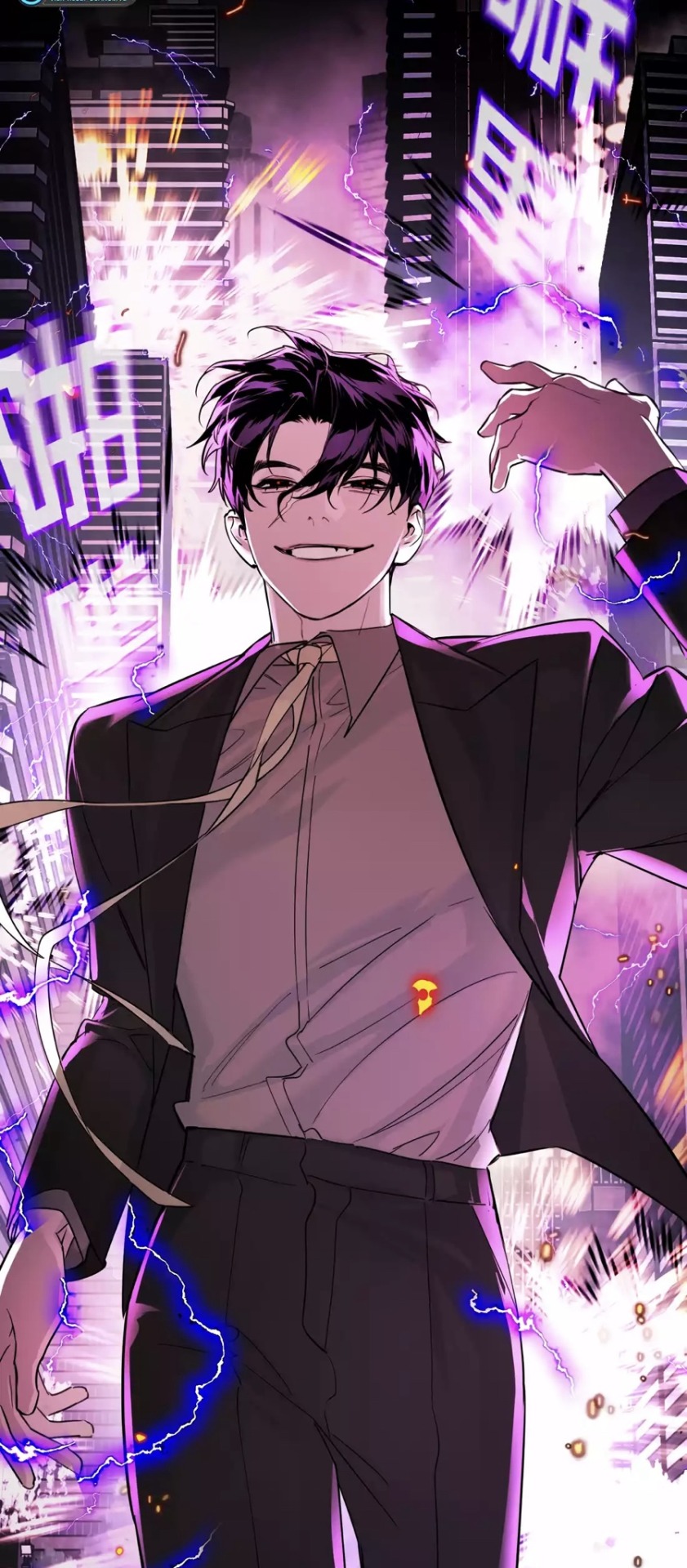
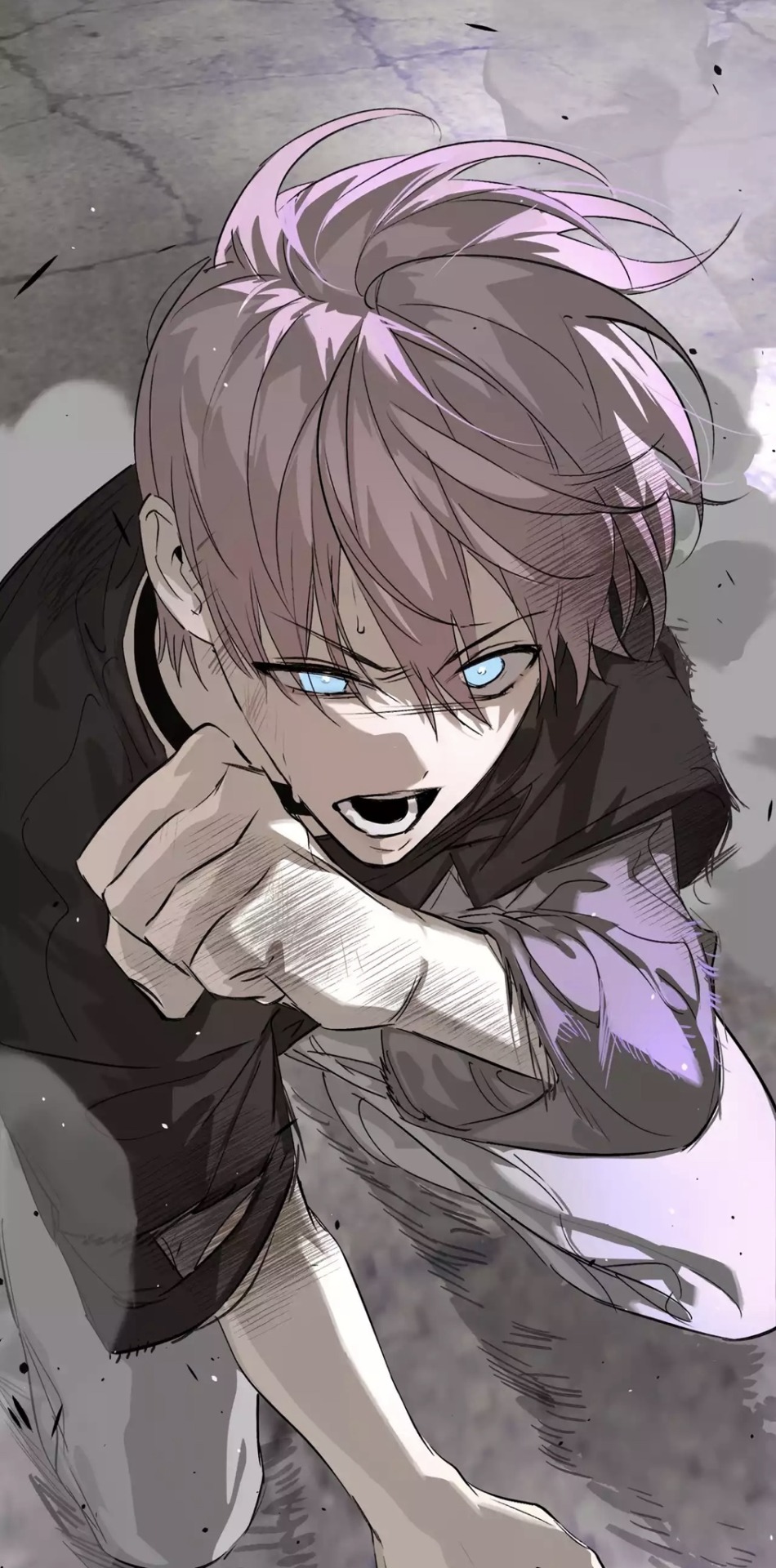
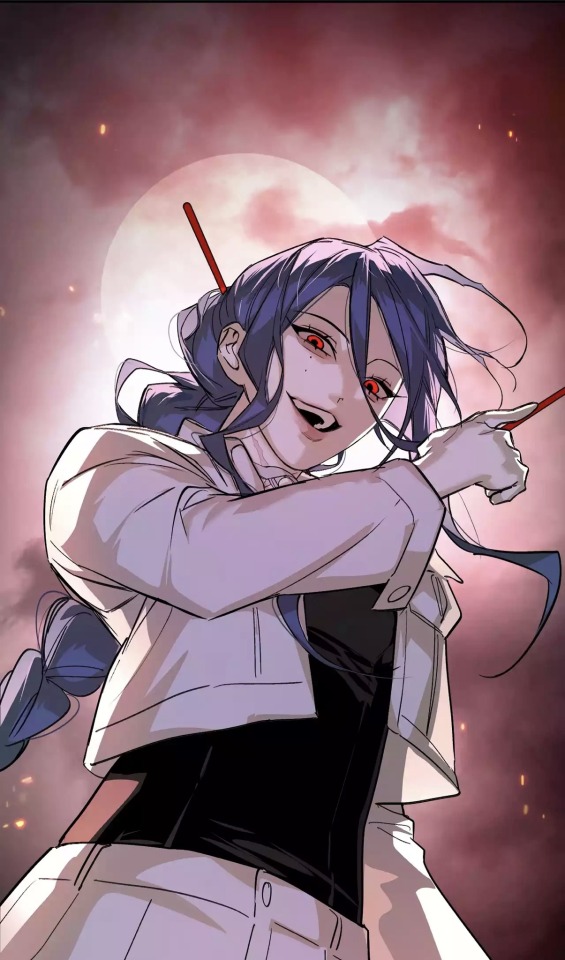
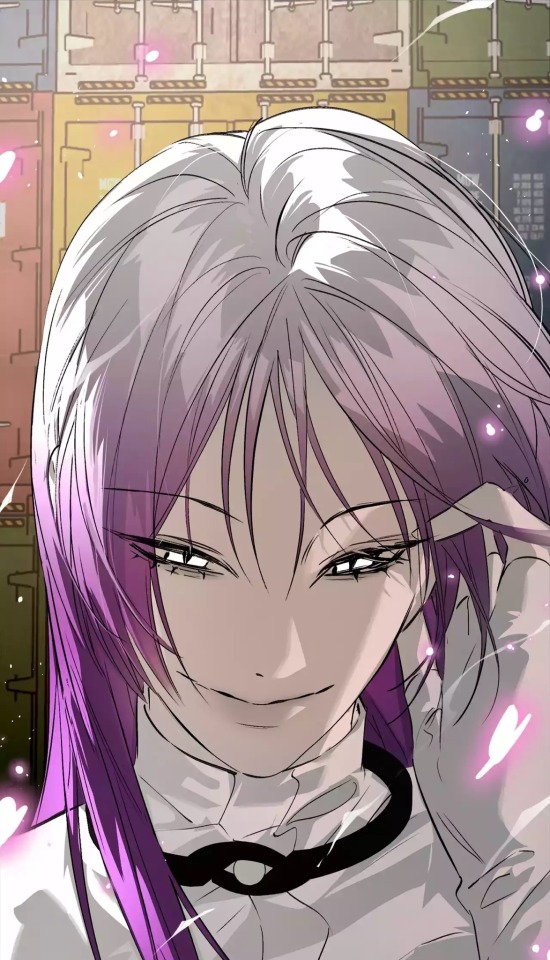
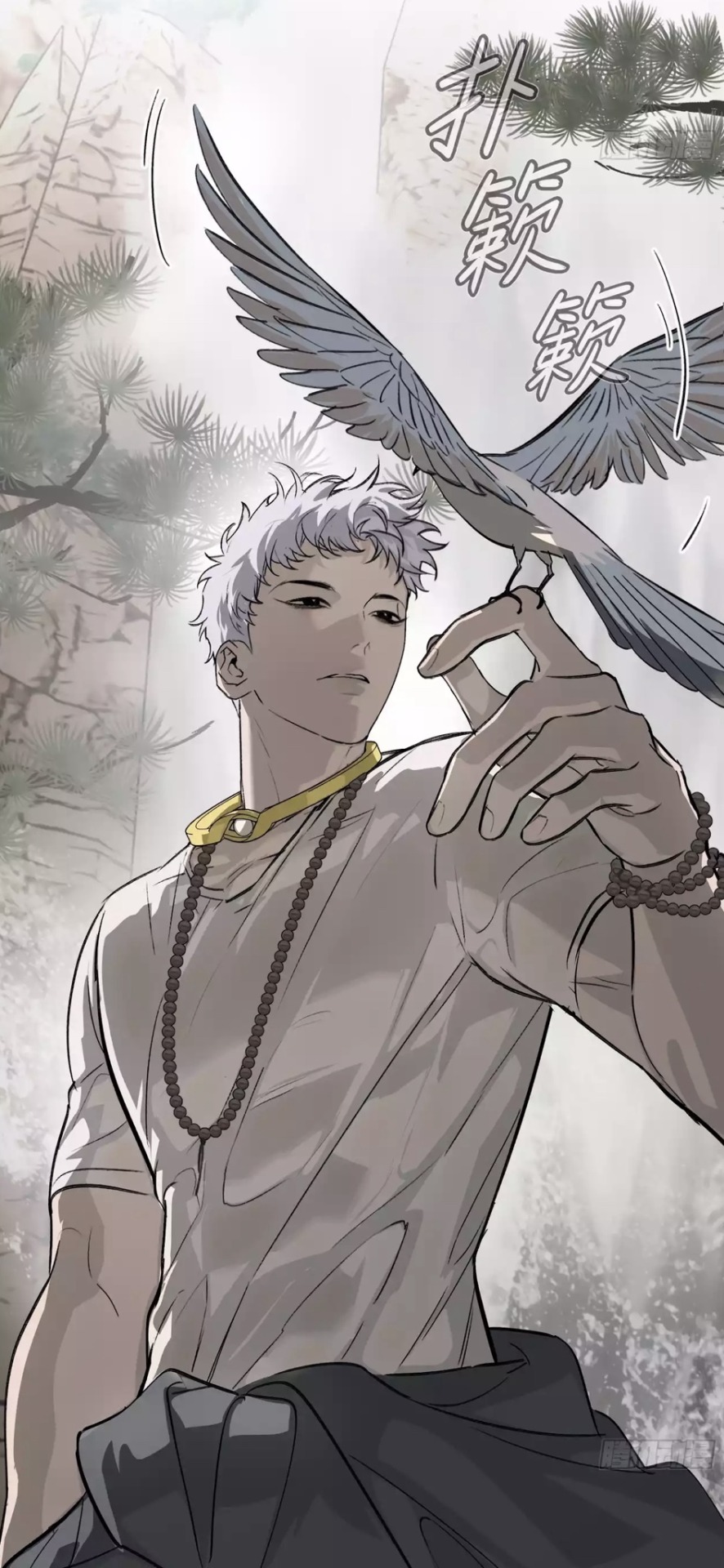
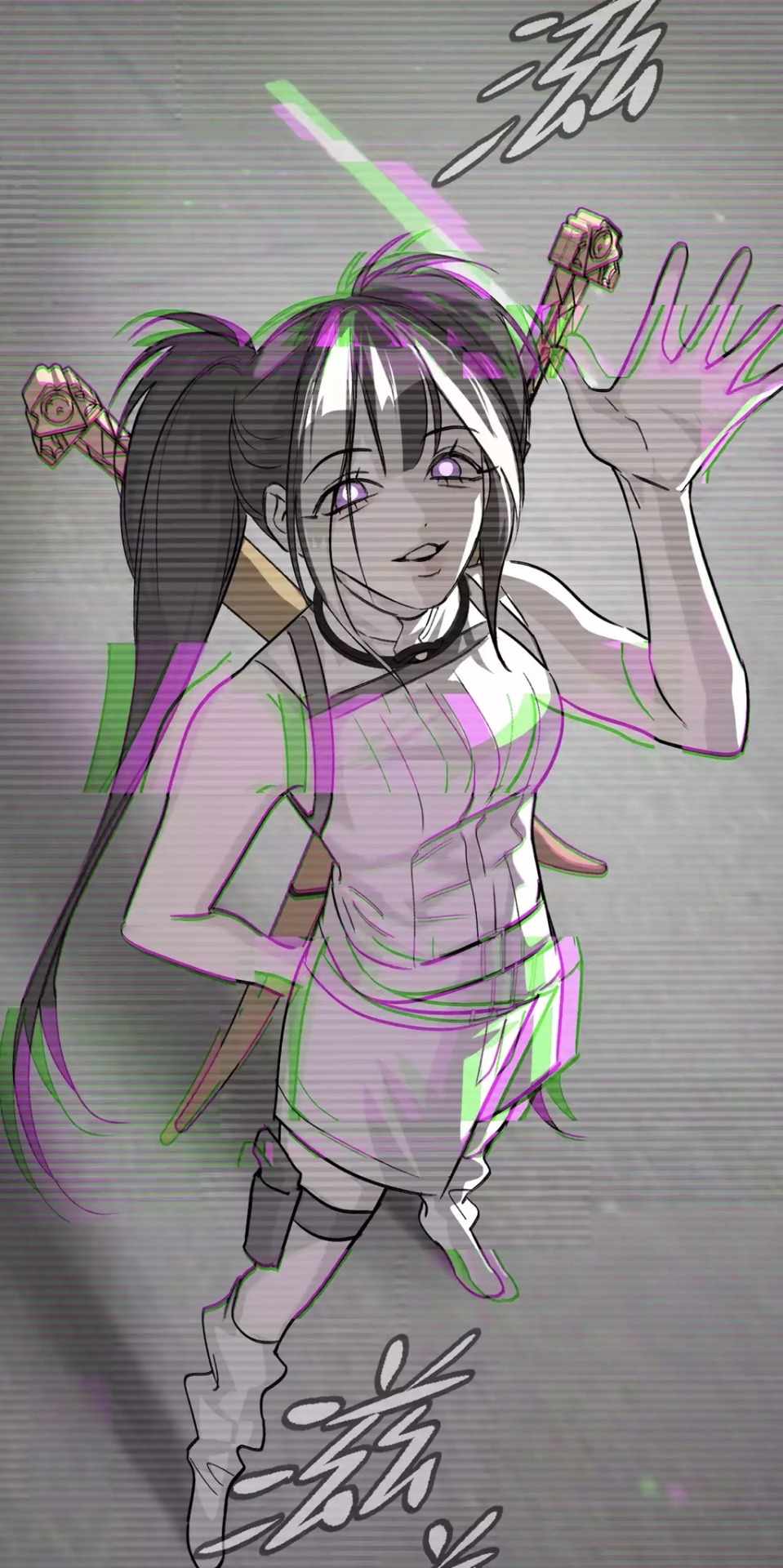
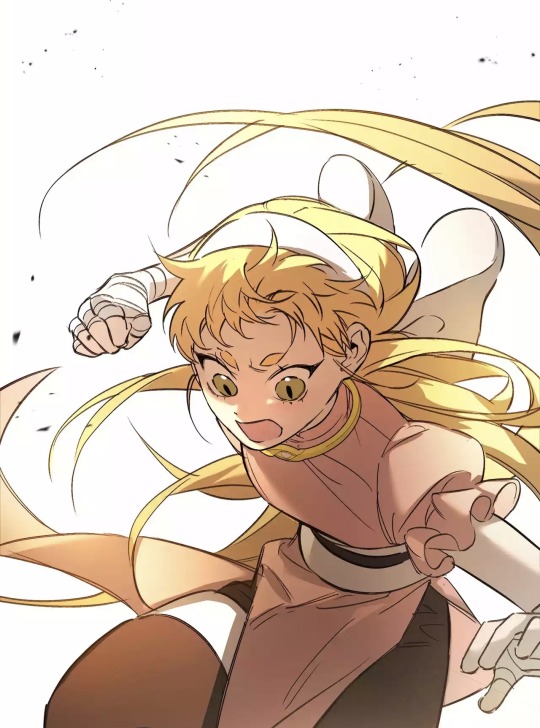
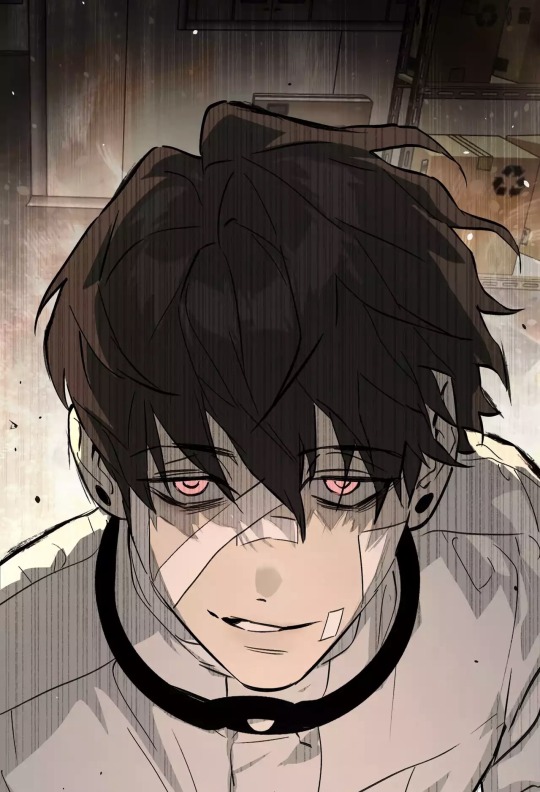
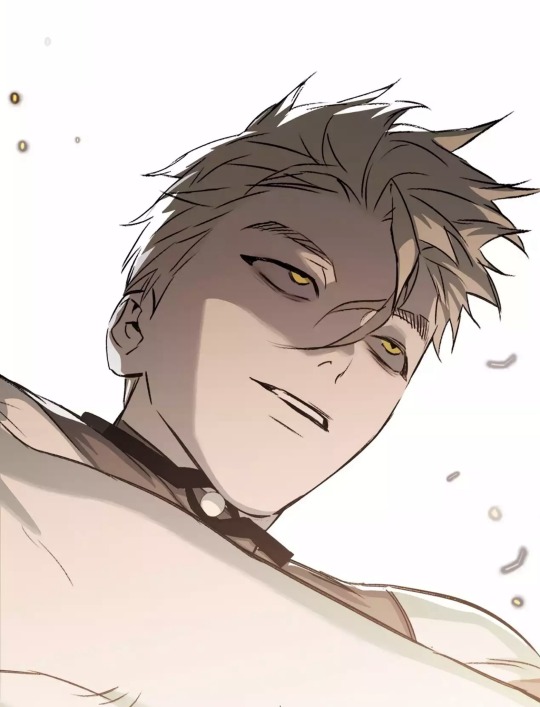
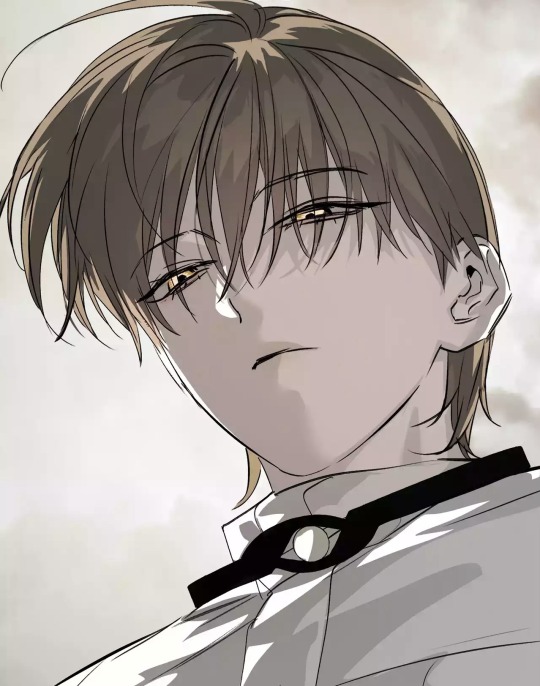
THE EVIL RING:
Leo Chuan / Shan Yue
Pei Xenia - Xia Mei
Zhou Xi - Teya
Han Youli - Qisi
Tian Lang / Yao Guang
#the evil ring#evil ring#shan yue#leo chuan#xia mei#yao guang#tian lang#zhou xi#manhua#su zhan#han youli#webtoon#e zhi huan#ni san sui#monkiko#sanyuan she#evil#wu yue#pei xenia#pei starfire#little black#dudu#ah chun#han shu#qisi#teya
35 notes
·
View notes
Text

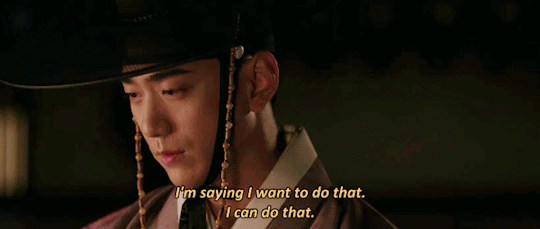







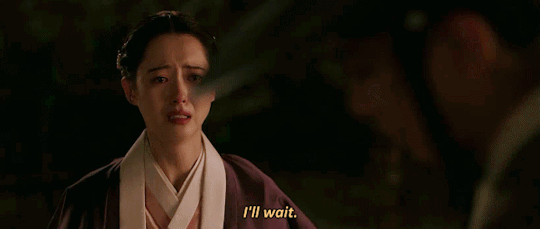

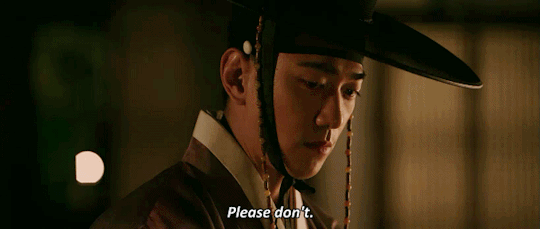

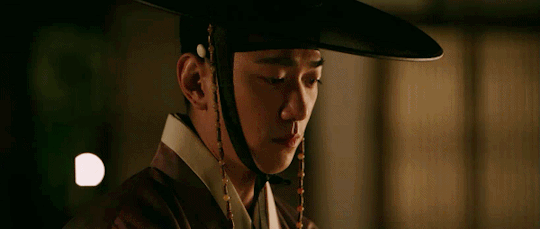

How can you say that love comes last with those eyes?
#the scandal of chun hwa#kdramaedit#go ah ra#sung joon#kdramadaily#kdramasource#perioddramasource#dailyasiandramas#perioddramaedit#cinemapix#cinematv#udeokmis#moonlightsdream#kdramanetwork#tvfilmsourcenet#filmtvcentral#asiandramasource#userbbelcher#chewieblog#userstream#useroptional
58 notes
·
View notes
Text
ㅤㅤㅤㅤㅤㅤㅤㅤㅤㅤ ⠀ 𓊆 ✮ 𓊇






























#icons#random#120x120#spirit icons#rdr2#arthur morgan#javier escuella#margaret qualley#meme#chun li#tekken#street fighter#ahs#lili#victorious#liz gillies#jade west
60 notes
·
View notes
Text




#scissor seven season 5#scissor seven#cike wu liuqi#plum blossom thirteen#killer seven#plum blossom eleven#da chun#dachun#jiang huilian#ah quan#red tooth#redtooth#chairman jiang
55 notes
·
View notes
Text




The Scandal Of Chun Hwa 1x02
#the scandal of chun hwa#go ah ra#the love story of chun hwa#춘화 연애담#kdramagifs#kdrama#korean drama#kdramaedit#kdramadaily#netflix#tv series#asian drama#korean#drama#kactress#actress#tv show#kdramas#tv shows#tvgifs#tvedit#dailyfilmsource
25 notes
·
View notes
Text
"Liu Chang is so interesting as a character".
No, he's not.
He's a garden variety misogynist, even if he's more erudite or a tad more obfuscatory about it than Wan Qing ( upto a point - remember the rape attempt? I sure do!) He's not interesting in the same way zillionth iterations of woobie misunderstood fascists aren't interesting. Whatever interiority the narrative tries to give him, can't quite rise above the general unsubtlety of the show, which is pretty much a Feminism 101 class. This is not a complaint I have about the show, btw- it doesn't have to be subtle about its politics or messaging for it to be hugely enjoyable, which it is. But in that vein, most of the men we meet fall on a spectrum of misogynist behaviour and attitudes. They're there for us to love and draw attention to our special flower Mudan, not the other way around.
Stop inventing reasons to center men in narratives that are for and about women, for fuck's sake.
#this has been a psa#i say this as a person going through a li xian phase#not even Jiang Chang is as interesting as Mudan#or Ah fu or Chun#some of y'all just like men a little too much#flourished peony
33 notes
·
View notes
Text
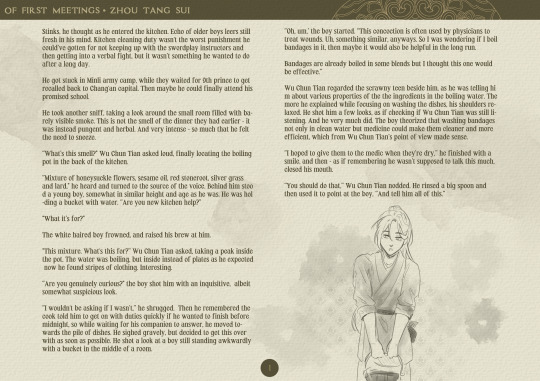
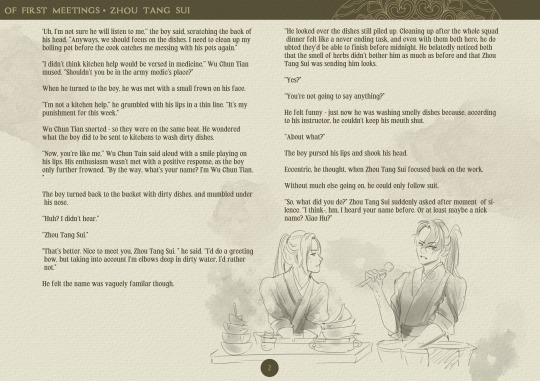
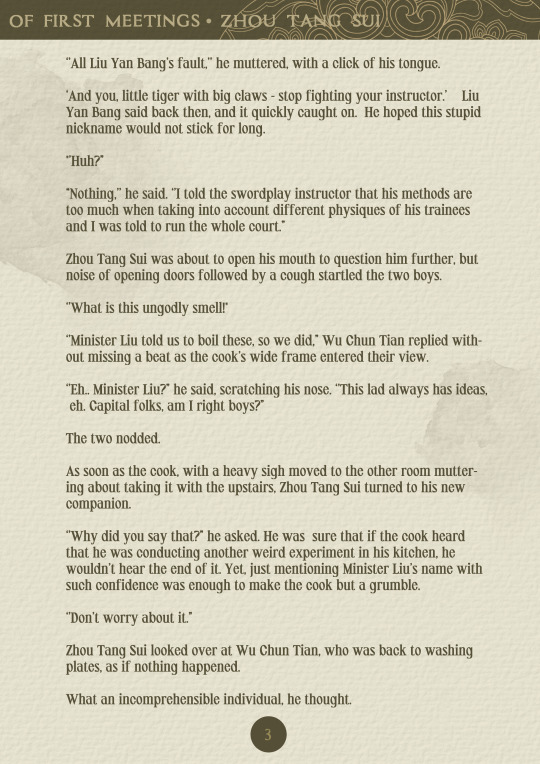
Of first meetings - Zhou Tang Sui
ALT. under cut.
Stinks, he thought as he entered the kitchen. Echo of older boys leers still fresh in his mind. Kitchen cleaning duty wasn't the worst punishment he could’ve gotten for not keeping up with the swordplay instructors and then getting into a verbal fight, but it wasn’t something he wanted to do after a long day.
He got stuck in Minli army camp, while they waited for 9th prince to get recalled back to Chang'an capital. Then maybe he could finally attend hispromised school.
He took another sniff, taking a look around the small room filled with ba-rely visible smoke. This is not the smell of the dinner they had earlier - it was instead pungent and herbal. And very intense - so much that he felt the need to sneeze.
‘’What’s this smell?” Wu Chun Tian asked loud, finally locating the boiling pot in the back of the kitchen.
‘’Mixture of honeysuckle flowers, sesame oil, red stoneroot, silver grass and lard,” he heard and turned to the source of the voice. Behind him stood a young boy, somewhat in similar height and age as he was. He was hol-ding a basin with water. ‘’Are you new kitchen help?”
“What it’s for?”
The white haired boy frowned, and raised his brew at him.
“This mixture. What's this for?’’ Wu Chun Tian asked, taking a peak insidethe pot. The water was boiling, but inside instead of plates as he expected now he found stripes of clothing. Interesting.
‘’Are you genuinely curious?” the boy shot him with an inquisitive, albeit somewhat suspicious look.
‘’I wouldn't be asking if I wasn’t,’’ he shrugged. Then he remembered the cook told him to get on with duties quickly if he wanted to finish before midnight, so while waiting for his companion to answer, he moved to- wards the pile of dishes. He sighed gravely, but decided to get this over with as soon as possible. He shot a look at a boy still standing awkwardly with a water basin in the middle of a room.
‘’Oh, um,’ the boy started. ‘’This concoction is often used by physicians to treat wounds. Uh, something similar, anyways. So I was wondering if I boi bandages in it, then maybe it would also be helpful in the long run.
Bandages are already boiled in some blends but I thought this one would be effective.’’
Wu Chun Tian regarded the scrawny teen beside him, as he was telling him about various properties of the the ingredients in the boiling water. Themore he explained while focusing on washing the dishes, his shoulders relaxed. He shot him a few looks, as if checking if Wu Chun Tian was still listening. And he very much did. The boy theorized that washing bandages not only in clean water but medicine could make them cleaner and more efficient, which from Wu Chun Tian’s point of view made sense.
‘’I hoped to give them to the medic when they’re dry,’’ he finished with a smile, and then - as if remembering he wasn’t supposed to talk this much, closed his mouth.
‘’You should do that,’’ Wu Chun Tian nodded. He rinsed a big spoon and then used it to point at the boy, ‘’And tell him all of this.’’
’Uh, I’m not sure he will listen to me,’’ the boy said, scratching the back of his head. ‘’Anyways, we should focus on the dishes. I need to clean up my boiling pot before the cook catches me messing with his pots again.”
“I didn’t think kitchen help would be versed in medicine,’’ Wu Chun Tian mused. ‘’Shouldn’t you be in the army medic’s place?”
When he turned to the boy, he was met with a small frown on his face.
‘’I’m not a kitchen help,’’ he grumbled with his lips in a thin line. ‘’It’s my punishment for this week.”
Wu Chun Tian snorted - so they were on the same boat. He wondered what the boy did to be sent to kitchens to wash dirty dishes.
‘’Now, you’re like me,’’ Wu Chun Tain said aloud with a smile playing on his lips. His enthusiasm wasn’t met with a positive response, as the boy only further frowned. ‘’By the way, what’s your name? I’m Wu Chun Tian.”
The boy turned back to the bucket with dirty dishes, and mumbled under his nose.
‘’Huh? I didn’t hear.”
‘’Zhou Tang Sui.”
“That’s better. Nice to meet you, Zhou Tang Sui. ” he said. ‘’I’d do a greeting bow, but taking into account I’m elbows deep in dirty water, I’d rather not.”
He felt the name was vaguely familiar though.
‘’He looked over the dishes still piled up. Cleaning up after the whole squad dinner felt like a never ending task, and even with them both here, he doubted they’d be able to finish before midnight. He belatedly noticed both that the smell of herbs didn’t bother him as much as before and that Zhou Tang Sui was sending him looks.
‘’Yes?”
‘’You’re not going to say anything?”
He felt funny - just now he was washing smelly dishes because, according to his instructor, he couldn't keep his mouth shut.
‘’About what?”
The boy pursed his lips and shook his head.
Eccentric, he thought, when Zhou Tang Sui focused back on the work.
Without much else going on, he could only follow suit.
‘’So, what did you do?” Zhou Tang Sui suddenly asked after moment of silence. ‘’I think-, hm, I heard your name before. Or at least maybe a nickname? Xiao Hu?”
‘’All Liu Yan Bang’s fault,’’ he muttered, with a click of his tongue.
‘And you, little tiger with big claws - stop fighting your instructor.’ Liu Yan Bang said back then, and it quickly caught on. He hoped this stupid nickname would not stick for long.
"’Huh?”
“Nothing,’’ he said. ‘’I told the swordplay instructor that his methods are too much when taking into account different physiques of his trainees and I was told to run the whole court.”
Zhou Tang Sui was about to open his mouth to question him further, but noise of opening doors followed by a cough startled the two boys.
‘’What is this ungodly smell!"
‘’Minister Liu told us to boil these, so we did,” Wu Chun Tian replied with- out missing a beat as the cook’s wide frame entered their view.
‘’Eh.. Minister Liu?” he said, scratching his nose. ‘’This lad always has ideas, eh. Capital folks, am I right boys?”
The two nodded.
As soon as the cook, with a heavy sigh moved to the other room mutter- ing about taking it with the upstairs, Zhou Tang Sui turned to his new companion.
‘’Why did you say that?” he asked. He was sure that if the cook heard that he was conducting another weird experiment in his kitchen, he wouldn’t hear the end of it. Yet, just mentioning Minister Liu’s name with such confidence was enough to make the cook but a grumble.
‘’Don’t worry about it.”
Zhou Tang Sui looked over at Wu Chun Tian, who was back to washing plates, as if nothing happened.
What an incomprehensible individual, he thought.
#oc#my ocs#oc writing#my art#orginal character#shuu ocs tag#zhou tang sui#wu chun tian#xiao hu literally means little tiger#back when zts was still a bit shy and didn't want to smack wct over his head all the time#the first drawing... how does he look so cute ah bby#bby is trying hard#wct: this punishment means nothing to me bcs i refuse to accept it as acceptable punishment#zts: im getting punishment because im a wimp we are not the same#also wct: when in doubt throw liu yan bang under the bus#shuuenkaart#series: the long ballad
19 notes
·
View notes
Text
@isohees
#edit#dorama#kdrama#korean#kdorama#mask girl kdrama#mask girl#kim momi#kim mo mi#kim mimo#kim mi mo#kim chunae#kim chun ae#han jae yi#han jaeyi#nana#in jinah#in jin ah#go hyun jung#go hyunjung
22 notes
·
View notes
Note
danbi dog walking w/ tae sort of meet cute-type date vibes
🪩 WORDCOUNT | 700 (exactly!) 🪩 NOTE FROM HOLLY | so i kinda think they're impossible to have a meet-cute, just because danbi was sooooo anti-tae at the start. like she always knew he was interested and used to try soooo hard to pretend that she wasnt!!! plus if anyone is a man hater (complimentary <3) it's danbi!! I can't remember when, but i know it's mentioned earlier on in the story that tae had been at memorial park with dan so.... here u go!
🪩 BD DRABBLES MASTERPOST 🪩

“Again?” Danbi sighs as she notices the man walking towards her up through the path of the Memorial Park.
She’d put her hands on her hips if either of them were free - but she’s currently got three dogs to each hand. The leads wrap around so tightly it’s a miracle her fingers haven’t fallen off yet.
Still, her facial expression conveys everything her body can’t - and yet Kim Taehyung has the audacity to stand there fucking smiling.
“Fancy seeing you here!” He beams, turning on his heel to stop himself from walking on by. Doesn't miss a beat. Heads in the same direction as Danbi, now.
“Y’know, some people would consider this stalking,” she tells him with nothing but disdain.
“See, I would agree,” Taehyung answers with contemplative arrogance. “But it’s funny - DB seems to reckon you’ve changed your route, recently?”
“Oh has she, now?” Danbi says, resisting the urge to curse you out. Loves you to death, but knows exactly what you’re doing. Begins to think that your joke about dressing up as cupid for Halloween isn’t really a joke.
“Mhmm,” Taehyung nods, hands in pockets. A little shy, but trying desperately hard not to be. “You used to do your walks down by the river, apparently.”
Danbi’s jaw is tense. Unwavering. “Sometimes a change of scenery is good. Gives the pups more mental stimulation. Different smells.”
“There are so many parks in the city,” he muses.
“Well I’ll pick a different one, once I’ve decided they’ve had enough of this one.”
“Maybe you should try the city forest,” Taehyung suggests. “The one by the last stop on line two. I go there pretty often, too.”
The narrowing of Danbi’s eyes only serves to make Taehyung smile. He’s learning pretty quickly which buttons of Danbi’s to press - and given how easy it is to wind her up, he doesn’t have to try particularly hard.
It’s what he likes about her, though. She’s fiery. Ignites a little something inside him.
“My route choices have nothing to do with you.”
“No?” He challenges. “So why’d it change after you found out my studio overlooks Memorial Park?”
“Coincidence.”
“Y’know,” Taehyung smirks. “Some people would consider it stalking.”
If there’s one thing Danbi hates, it’s when men make her smile - and Taehyung is getting dangerously close to that. She has to nip this in the bud, or otherwise her mild-infatuation with him will inevitably grow, and she cannot let that happen.
She’s dated musicians. Dated pretty boys. Ones with egos. Knows that artists are even worse.
And the ones who look like Kim Taehyung? Nothing but trouble. She knows that as soon as her guard is down, some girl from his art school will end up back in his DM’s and then she’ll have to fight for his attention, which she refuses to do. Dreads to think of the notches in his bedpost. Doesn’t wanna have to look at the art he’s made from other muses.
Again, she’s dated men who are menaces before. Had songs written for other girls cosplayed as serenades for her (fuck you, Sanghyuk). Refuses to let it happen again.
Better to just fight with him. Easier that way.
She’s incapable of doing anything by half measures though, so hatred seems like the best course of action.
“With all due respect, Taehyung, I’m working,” she shrugs, picking up her pace.
“Let me help.”
“No.”
“I'm good with animals.”
“You’re not insured.”
“I know how to walk a dog”
“No.”
“Let me-”
“Fine! Take Mabel,” Danbi finally relents, adjusting the leashes to hold one out from him. On the end is a Pomeranian, not too dissimilar from Taehyung’s own dog - the same dog Taehyung keeps trying to convince Danbi to walk, just so he has an excuse to see her. “She bites.”
“It’s fine,” Taehyung says, taking the leash in his palm and wrapping it over slightly for a little extra security. Starts walking. Is cheeky, as he says, “I’m used to bitches who bite.”
“You did not just call me a bitch,” Danbi gasps, genuinely affronted. It’s the first time throughout this entire interaction that Taehyung thinks he’s getting genuine emotion from her. Knows the rest of it is bull.
“Well, are you planning on biting me?” He flirts. Wouldn’t be opposed. In fact, he’d quite like it.
“Shut up,” she whines with a deadly roll of her eyes. “Just walk the damn dog."
#ooooooo i do love these two#she's a fire sign#he's so earthy!! so calm!!#they're gonna burn the world down!!!!#mabel is me as a dog <3#also fun fact#danbi is the only one of the female ocs that has a faceclaim in my head as i write#like i know what they all look like#but she's the only one where im like ah yes she looks like xyz#if you're curious the person is chun hyojeong - she performs with a group called leenalchi#aka the most gorgeous woman i have ever seen in my life#saw leenalchi at a festival and both me and my friend were (1) obsessed with the group and (2) in love with her#byholly#jungkook fanfic#dappleddaisies#jungkook fanfiction#bd!drabbles#jk ff#taehyung x oc#taehyung drabbles#bad decisions#bd!tae#taehyung fluff
27 notes
·
View notes
Text
remember how people kept saying that the biggest threat to JangChae was Ryang Eum (the 'snake' and 'two faced homosexual [yes literally saw those words in a comment before it had gotten deleted in the MDL comment section for other unsavory remarks made about the other actors. i can call my son and myself a homosexual bc we are one but not like how they were trying to convey it tyvm]') and Gak Hwa/Qing Princess (the Jang Hyun obsessed bounty hunter who has a choking kink) but the actual threat turned out to be the straight men (Mr. F*ckass General Ex, the f*ckass king and newly minted f*ckass husband Yeon Joon) bc they weren't sh*t and a half. funny how that happened
#tv: my dearest#my dearest#mbc my dearest#namgoong min#nam goong min#ahn eun jin#lee hak joo#lee da in#kim yoon woo#lee chung ah#lee chungah#kdrama#local gay watches My Dearest (and is subsequently f*cked up).txt#local gay watches k-dramas.txt#look i'm going off of what i've watched up to ep 19 the spoilers i've seen for ep 20 and the preview for ep 21. the straight men#in this show except for Gu Jam and Jang Hyun (and Yang Chun) do not deserve rights!!!!!!#was going to say that i hope Eun Ae divorces Yeon Joon and then he chokes on a d*ck but he doesn't deserve the pleasure of#having a d*ck in his mouth anyway when Ryang Eum isn't getting any#so idk. take poison and die like the f*ckass p*ssy bitch you are as long as you're dead
18 notes
·
View notes
Text
ive been beating my head against the xiao libraryofruina fight for sooo long... please spare me. at least iron lotus is a good song
#and i keep on not getting chuns book for some reason?? so i have to redo that fight 1 limbillion times#ah.. video games#txt
0 notes
Text























The classic trope of the princess' first love withdrawing to not drag their love through the mud, pushing her away with harsh words (but the love in his eyes so apparent) 💯💯💯💯💯
#the scandal of chun hwa#kdramaedit#go ah ra#sung joon#kdramadaily#kdramasource#perioddramasource#dailyasiandramas#perioddramaedit#cinemapix#cinematv#udeokmis#moonlightsdream#kdramanetwork#tvfilmsourcenet#filmtvcentral#asiandramasource#userbbelcher#chewieblog#userstream#useroptional#I'm saying it's illegal to cast cameos who have this much chemistry with the lead
33 notes
·
View notes
Text
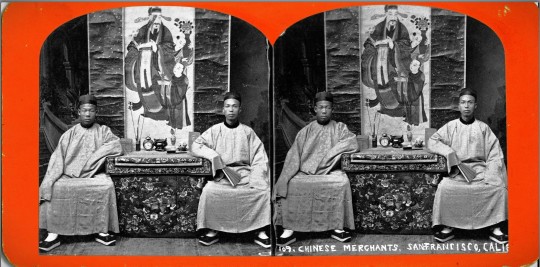
“109. Chinese Merchants, San Francisco, Calif.” c. 1890 – 1899? Stereograph by Nesemann Woods Gallery, Marysville CA (from the Wallace B. Chung and Madeline H. Chung Collection of the University of British Columbia Library).
Merchants of Old Chinatown
In the late 1840s and the 1850s, Chinese merchants and traders made their initial foray into California. By February 1849, the number of Chinese had increased to 54 and by January 1850, historians would count 787 men and two women in San Francisco. In December 1849, the Alta California newspaper reported that 300 Chinese convened a meeting at the Canton Restaurant on Jackson Street for the purpose of organizing the “Chinese residents of San Francisco” and engaging the services of lawyer Selim E. Woodsworth to “act in the capacity and adviser for them.”
In his book, Genthe’s Photographs of San Francisco’s Old Chinatown, historian John Tchen wrote about the vanguard of old San Francisco Chinatown’s merchant elite as follows:
“These pioneers hailed primarily from the Sanyi (Saam Yap) or Three Districts [三邑], as well as the Zhongshan area in the immediate vicinity of Canton. It's important to note that Nanhai (Namhoi) and Panyu (Punyu) stood out as the most prosperous districts within Guangdong Province. Their economic pursuits ran the gamut from cultivating fertile agricultural lands, breeding silkworms and fish, to crafting silk textiles, producing ceramics for both domestic and international markets, and engaging in various other commercial endeavors. “What set apart the merchants and artisans from Sanyi and Zhongshan was their mastery of a more refined city dialect compared to their Siyi (Sei Yap) counterparts, who mainly consisted of poorer, rural communities. Remarkably, over 80 percent of Chinese immigrants in North America originated from the Siyi [四邑] region. A noteworthy portion of these Sanyi merchants belonged to the emerging class of compradores, individuals who facilitated business transactions on behalf of Western trading companies. These California-based Sanyi merchants thus brought prior experience in dealings with Western entrepreneurs, and California was seen as a promising arena to expand these lucrative connections.”
With the completion of the Transcontinental Railroad in May of 1869, the more sophisticated and adventurous members of San Francisco’s pioneer Chinese merchant community would begin exploring other cities in the United States in search of opportunity.
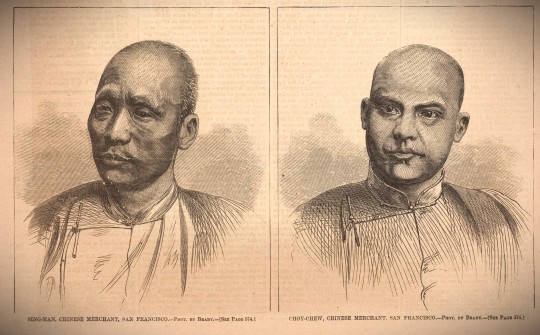
“Sing-Man, Chinese Merchant, San Francisco” and “Choy-Chew, Chinese Merchant, San Francisco,” Harper’s Weekly, September 4, 1869, wood engraving on paper. Artist unknown, artist after a photograph by Mathew Brady, 1869 (from the collection of the National Portrait Gallery).
For example, in the Harper’s Weekly article (Sept 4, 1869, page 574), the reporter identified merchant Choy Chew as a San Franciscan and a talented linguist of sufficient intellect and stature to be invited to give a speech at a European-American banquet. He reportedly visited Chicago with a fellow merchant, Sing Man, before traveling to New York where the pair were regarded as “representatives of Chinese industry and commerce.”
At the banquet in Chicago, Choy Chew delivered the following remarks:
”Eleven years ago I came from my home to seek my fortune in your great Republic. I landed on the golden shore of California, utterly ignorant of your language, unknown to any of your people, a stranger to your customs and laws, and in the minds of some an intruder — one of that race whose presence is deemed a positive injury to the public prosperity. But gentlemen, I found both kindness and justice. I found that above the prejudice that had been formed against us, that the hand of friendship was extended to the people of every nation, and that even Chinamen must live, be happy, successful and respected in ‘free America.’ I gathered knowledge in your public schools; I learned to speak as you do; and, gentlemen, I rejoice that it is so; that I have been able to cross this vast continent without the aid of an interpreter; that here in the heart of the United States I can speak to you in your own familiar speech, and tell you how much, how very much, I appreciate your hospitality; how grateful I feel for the privileges and advantages I have enjoyed in your glorious country; and how earnestly I hope that your example of enterprise, energy, vitality, and national generosity may be seen and understood, as I see and understand it, by our Government … ”We trust our visit, gentlemen, may be productive of good results to all of us; that the two great countries, East and West, China and America, may be found forever together in friendship, and that a Chinaman in America, or an American in China, may find like protection and like consideration in their search for happiness and wealth.“ -- from the Scientific American, new series, vol. 21, no. 9, p. 131 (August 28, 1869)
The founding in 1888 of the Merchants’ Exchange in old San Francisco Chinatown represented the logical culmination of several decades of robust business operations by the pioneer Chinese merchants in the city and beyond.
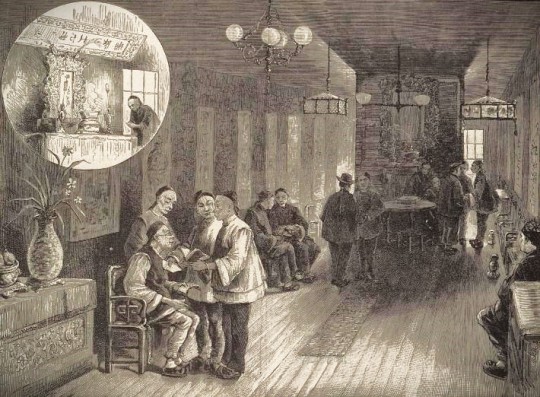
“Chinese Merchants’ Exchange, San Francisco.” Lithograph from Harper’s Weekly, Vol. 26, March 18, 1882 (from the collection of The Bancroft Library, University of California, Berkeley.
In his book, A Guide Book to San Francisco (published by The Bancroft Company in 1888), John S. Hittell described the Chinese Merchants Exchange as follows:
“At 739 Sacramento Street are the new rooms of the Chinese Merchants' Exchange. They are fitted up in the ordinary Chinese style, and though presenting no special attraction to the visitor, the business transacted there is of considerable importance. A Chinese merchant, contractor, or speculator never starts on any enterprise alone. He always has at least one partner, and in most cases several. He makes no secret of his transactions, but converses about them at the exchange, and often goes there in search of capital when his own means are insufficient. He sometimes applies to that institution to find him a capable man to manage a new business which he is about to start. If, as often happens, one be selected who is in debt to other members, they make arrangements which will not interfere with the new enterprise; and the debtor is not unfrequently released from his obligations.”
Fung Tang
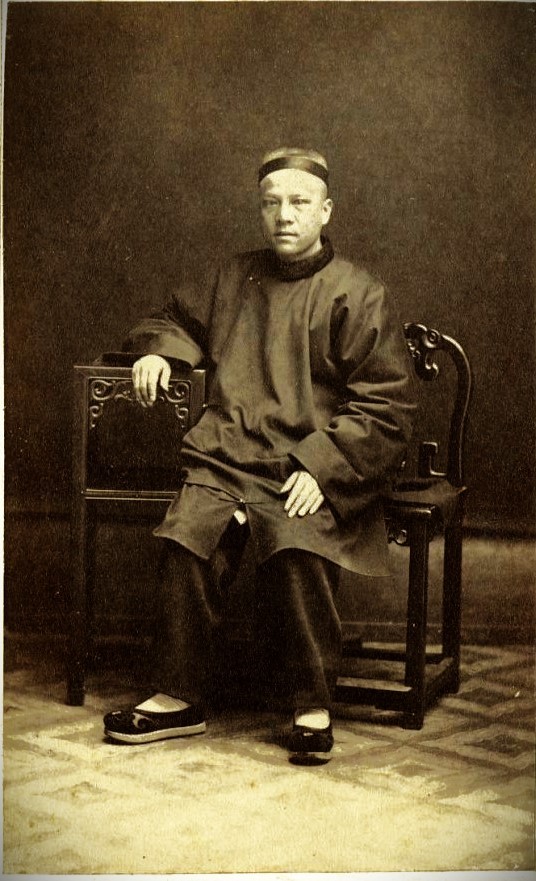
Fung Tang, c. 1870. Photo by Kai Suck (from the collection of the California Historical Society).
The address of the Merchants’ Exchange at 739 Sacramento Street was hardly surprising, as it shared the same building which had housed the mercantile house of a legendary merchant, Fung Tang. Historian York Lo, in his article for The Industrial History of Hong Kong Group website, described Fung as “a native of Jiujiang (Kow Kong) in the Nanhai county (南海九江) in Guangdong, Fung Tang followed his uncle Fung Yuen-sau (馮元秀) to California in 1857 at the age of 17 and worked at Tuck Chong & Co (德祥號辦莊), a trading business founded by his uncle and his fellow Nanhai native Kwan Chak-yuen (關澤元).” In the Langley San Francisco directory of 1868, the Tuck Chong & Co. is listed as “(Chinese) merchants” located on Chinatown’s first main street at 739 Sacramento Street.
“In his spare time,” York Lo writes, “he learned English from Reverend William Speer and became fluent in the language. With his linguistic skills, he became a bridge between the Chinese and the white community in San Francisco and even befriended Peter Burnett, the first Governor of California, who described Fung in his memoir as ’a cultivated man, well read in the history of the world, spoke four or five different languages fluently including English, and was a most agreeable gentleman, of easy and pleasing manners’.”
As such, Fung Tang must be considered as a logical client for the pioneer Chinatown photographer, Kai Suck. A professional studio portrait would have conferred respectability in the eyes of the non-Chinese businessmen and politicians with whom he interacted. In fact, Fung appears to have deployed the same portrait now reposing in the collection of the California Historical Society as part of his commercial advertising in Hong Kong.
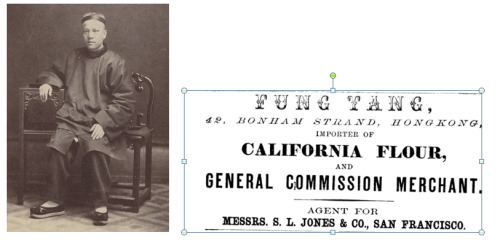
An advertisement for Fung Tang’s flour import business in the Sheung Wan district of Hong Kong.
For more details about Fung’s business exploits and his public service, including his election to the board of directors of the Tung Wah clinic (the original predecessor organization of the future Chinese Hospital), readers are encouraged to read York Lo’s piece here: https://industrialhistoryhk.org/fung-tang-the-firm-the-family-the-transpacific-metals-trade-and-tin-refinery/?fbclid=IwAR3DU6pEcaEw6w2uH1OZvFBFL8vg-Rl4keBS-VkbcttFuHKlx973g3ZjcY8
Tchen asserts that the influx of British and other Western imperialist powers into China’s major treaty ports transformed the status of merchants engaged with Western trading companies. Rather than operating on the margins of Qing-era society, the merchants gained unprecedented prestige and influence. Beyond China's borders, they experienced far more freedom to engage in trade and amass substantial profits without the worry of state-imposed restrictions. They rapidly acquired the necessary language skills and business acumen to navigate their newfound opportunities.
San Francisco’s early Chinese merchants swiftly grasped the English language and American business practices, excelling in American-style transactions, and developing strategies for fostering positive relations with the general San Francisco populace. The local press affectionately labeled them "China Boys." They made conscious efforts to participate in the celebrations of significant American holidays, further endearing themselves to the San Francisco community.
This approach significantly bolstered their rapport with the local population, as evidenced by the California Courier's glowing praise: “We have never seen a finer-looking body of men collected together in San Francisco. In fact, this portion of our population is a pattern for sobriety, order, and obedience to laws, not only to other foreign residents, but to Americans themselves," declared Cornelius B. S. Gibbs, a marine-insurance adjuster, in 1877. Gibbs emphasized the high esteem in which Chinese merchants were held among white business circles. “As men of business, I consider that the Chinese merchants are fully equal to our merchants. As men of integrity, I have never met a more honorable, high-minded, correct, and truthful set of men than the Chinese merchants of our city.”
Attempts to participate in mainstream society, however, were not always welcomed by lower-class elements of white society as evident in this news account about Fung Tang’s appearance in San Francisco’s California Theatre in September 1869:
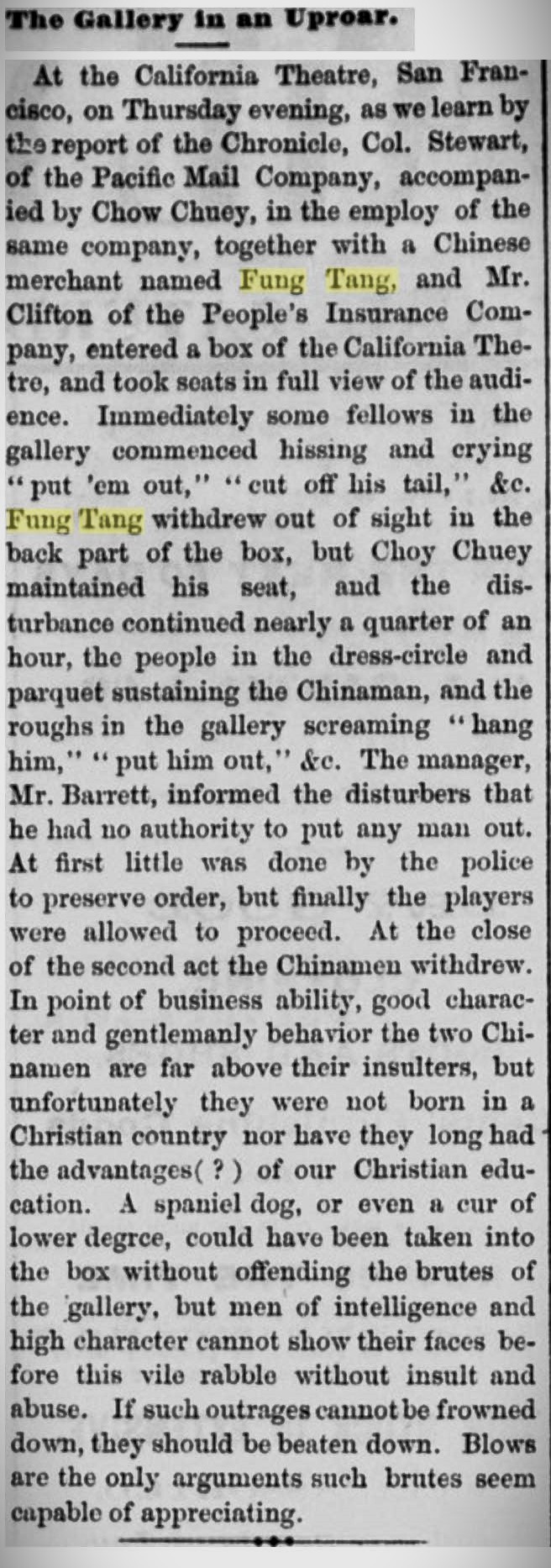
Clipping from the San Jose Mercury News, September 18, 1869 (vol. I no. 42)
Fung Tang’s transpacific success in San Francisco was hardly unique among the ranks of Chinatown’s early merchant class. He exemplified the business acumen of his fellow pioneering entrepreneurs and their establishment of transpacific trading posts in strategic locations.
Lai Chun-chuen and Chy Lung Co.
The story of the pioneer business of Chy Lung & Co. predates the history of San Francisco Chinatown itself, and its establishment spurred the rise of Chinatown’s first commercial strip, Sacramento Street (唐人街; canto: “Tohng Yahn Gaai”) or “Chinese Street.”
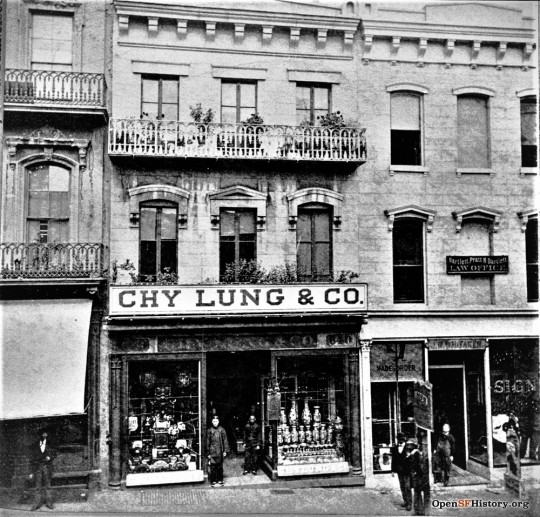
An enlargement of the stereograph taken by Carleton Watkins for the Thomas Houseworth & Co., and “[e]ntered according to Act of Congress, in the year 1866 by Lawrence & Houseworth, in the Clerk’s office of the District Court of the United States, for the Northern District of California.”
“Among the early Chinese settlers were merchants like Lai Chu[sic]-chuen,” the late historian Judy Yung wrote in her pictorial book, San Francisco’s Chinatown (published by the Chinese Historical Society of America). “Upon arrival in 1850, he opened Chinatown’s first Bazaar at 640 Sacramento Street, importing teas, opium, silk, lacquered goods, and Chinese groceries.”
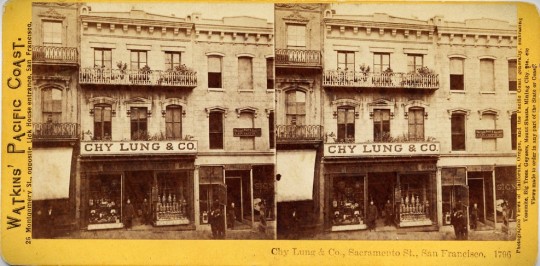
"Chy Lung & Co., Sacramento St., San Francisco. 1796" c. 1866. Photograph by Carleton Watkins for his Watkins' Pacific Coast stereograph series (from a private collection).
Chy Lung’s founder, Lai Chun-chuen (a.k.a. Chung Lock), came to San Francisco in 1850 from Nam Hoi county. According to UC professor Yong Chen, the business founded by Lai and, his partners Xie Mingli, Fang Ren, Sheng Wen, and Chen Nu, appear in the earliest business directories for San Francisco. A “Chyling, china mer, 188 Washington” appears in the Parker directory for 1852-1853. The Colville’s directory of 1856 lists a “Chy Lung (Chinese) mcht, Canton Silk and Shawl Store, 166 Wash’n,” and the business would remain on Washington Street (moving to 612 Washington St. by 1858) until 1863 when it relocated to 642 Sacramento Street. By 1865, the Chy Lung & Co. had either expanded or taken over the address of 640 Sacramento Street.
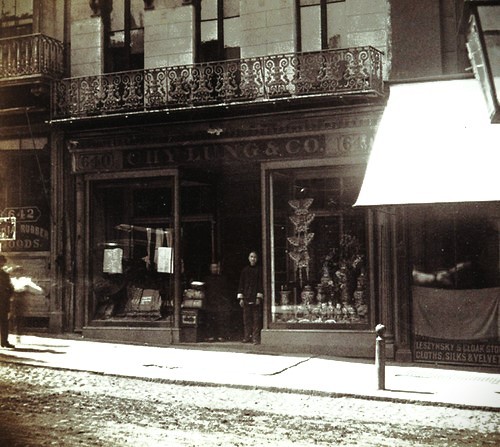
Portion of the stereograph “No. 391 Chinese Store. Chy Lung & Co.,” c. 1866. Published by Lawrence & Houseworth (from in the collections of the Society of California Pioneers, Wells Fargo Corporate Archives, and the Library of Congress).
“He imported Chinese prefabricated houses and cargoes of Chinese goods, teas, silk, lacquer and Porcelain wears, and even opium,” historian Phil Choy wrote. “The drug that made American merchants millionaires in the China trade now found its way to California for both the Chinese and American markets Chy Lung was one of only two Chinese businesses at the time that advertised in an American newspaper, the Daily Alta California.”

“No. 391 Chinese Store. Chy Lung & Co., Sacramento Street.” c. 1866. Published by Thomas Houseworth & Co. (from in the collection of the New York Public Library).
Lai Chun-chuen is remembered not only for his business acumen but also as the principal author of the objections to the anti-Chinese movement in California and plea for civil rights as published in the pamphlet, Remarks of the Chinese Merchants of San Francisco, upon Governor Bigler’s Message, and Some Common Objections (San Francisco: Whitton, Towne, 1855).
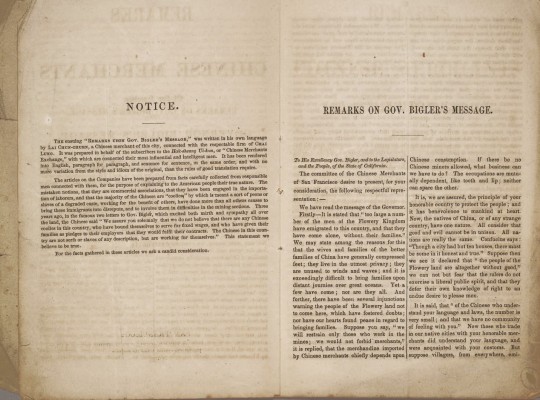
The preface to Remarks of the Chinese Merchants of San Francisco upon Governor Bigler’s Message, and Some Common Objections of 1855 (from the collection of the Bancroft Library). The second line of the first paragraph identifies Lai Chun-chuen as “a Chinese merchant of this city, connected with the respectable firm of CHAI LUNG.”
Chy Lung & Co. continued to play a leading role in the Chinese merchants exchange until Lai Chun-chuen’s death on August 30, 1868. The business remained a fixture of the Chinatown business community for the rest of the 19th century, and it adopted the new communications technology of the telephone, as shown by the Pacific Telephone directory for the Chinese Exchange in 1902.

The listing for Chy Lung & Co. as it appeared in the Wells Fargo directories of Chinese business for 1878 and 1882.
The Chy Lung & Co. business, and others established by Chinatown's merchants, soon comprised a source of both tangible and symbolic power within the rapidly growing Chinese community in the American West. As the Chinese immigrant population swelled, businesses catering to their specific needs diversified and expanded. A hierarchical structure emerged, influenced by both economic factors and the district of origin. The wealthier Sanyi individuals typically presided over larger, commercially successful enterprises, including import-export firms. Those from the Nanhai District dominated the men's clothing and tailoring sector, as well as butcher shops. The neighboring Shunde District populace exercised control over overalls and workers' clothing factories.
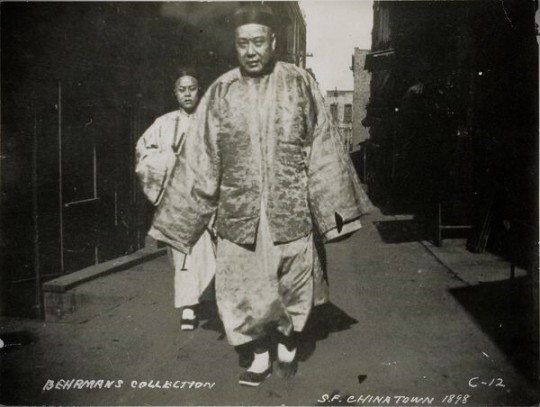
“S.F. Chinatown 1898 C12”. Photographer unknown (from the Martin Behrman Collection of the San Francisco Public Library). A well-attired merchant and possibly his son walk south on Spofford Alley from Washington to Clay Street.
Meanwhile, Chinese hailing from the Zhongshan District, which represented the second-largest Chinese population in California, were prominent in the fish and fruit orchard businesses, as well as in the production of women's garments, shirts, and underwear.
"Quan Quick Wah"
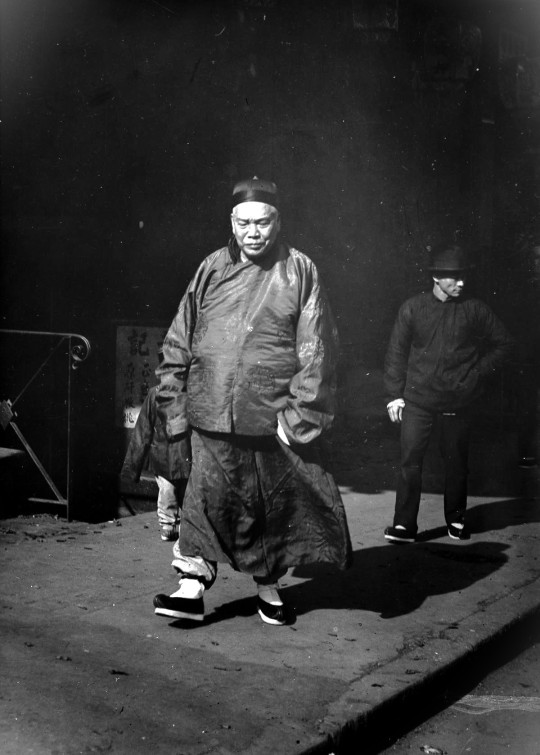
“Merchant and Bodyguard” c. 1896 – 1906. Photograph by Arnold Genthe (from the collection of the Library of Congress). A descendant of the large, confident man shown in traditional robes identifies him as San Francisco merchant “Quan Quick Wah.” Based on other photographs of this Chinatown location, the pair appears to be walking on the west side of Waverly Place toward its intersection with Clay Street. In his book about Genthe’s Chinatown photographs, historian Jack Tchen wrote about this imposing figure followed by a bodyguard as follows: “The powerfully built man dressed in traditional silk robes has been described as a tong leader. Whether he was a tong leader, a wealthy merchant, or both, his dress and carriage convey a strong presence. Tong leaders came to rival the power of wealthy merchants. The man following the merchant or tong leader is said to have been his bodyguard, protecting him from the attack of a rival tong. In the photograph the two are passing under ornate cloth lanterns that indicate a pawnshop business.”
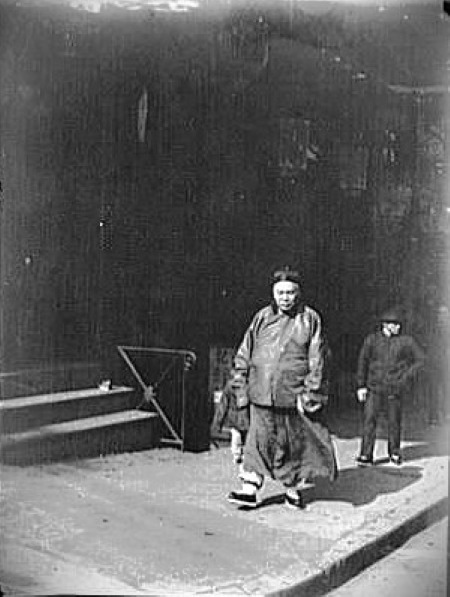
"Merchant and Bodyguard” c. 1896 – 1906. Photograph by Arnold Genthe (from the collection of the Library of Congress). This full photograph in the Library of Congress shows that Genthe’s image fortunately included a portion of the sign for the entrance to a basement restaurant. The signage (which appears in other photographs of this area), indicates that the merchant and bodyguard were photographed walking on the west side of Waverly Place (at about no. 23 and 25 Waverly) and toward the southwest corner of its intersection with Clay Street. Tchen’s guess that the background store frontage was a pawnshop is probably correct, as the “Qung Hing Art Co.” pawnshop occupied space at 25 Waverly during the 1890s. The headquarters of the merchant-controlled, Ning Yung district association was located at 23 Waverly.
Yee Ah-Tye
In old Chinatown, merchants’ personal use of bodyguards or alliances with fighting tongs were common. The organization and fragmentation of district and clan associations, along with sharp business competition, often placed lives, as well as livelihoods, at risk. For example, the Kong Chow association traced its origin to about 1853, when the influential community leader, Yee Ahtye (a.k.a. “George Athei”) persuaded members of his Yee clan of Sunning, which had remained in the Sze Yup Co. (after a number of clans split off to organize today’s dominant Ning Yung Association), to finally secede. The action by the Yee clan was joined by clans from Hoiping and Enping counties after a dispute over the presidency of the Sze Yup Co. in 1862. The resulting new association, the Hop Wo, soon challenged the merchant Ah-Tye for the custody of a piece of land on which Ah-Tye had allowed the Sze Yup Association to build a headquarters building. Yee eventually deeded the land to a new Kong Chow Association, which his fellow Sunwui merchants founded in 1866. The dispute over this property raised to such a level that Yee and his associates were compelled to organize a secret society, the Suey Sing Tong, to protect the asset and enforce his decision.
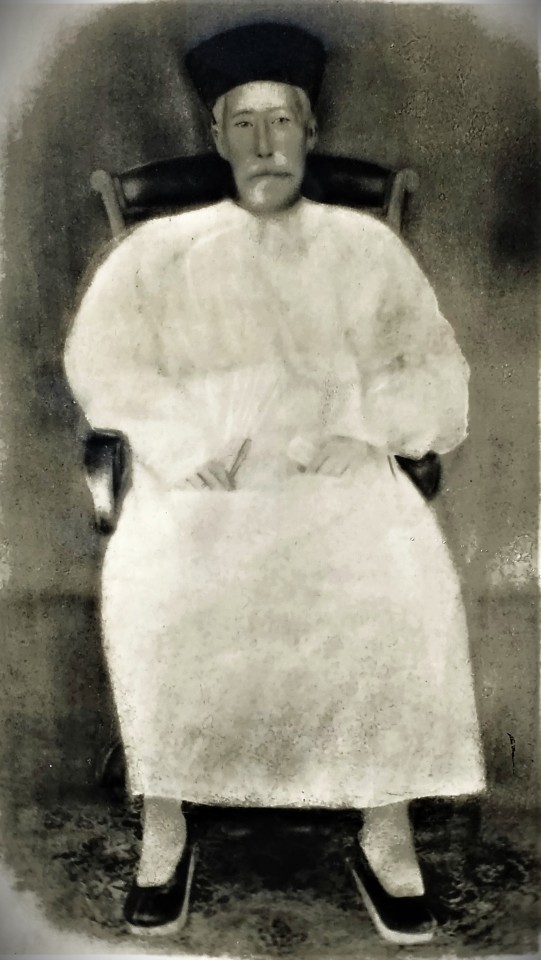
Portrait of Yee Ah-Tye (courtesy of the Chinese Six Companies). Yee was an elite merchant of Chinatown and was considered a co-founder of the Suey Sing Tong.
Born around 1829 in Guangdong province, Yee Ah-Tye had arrived in San Francisco just before the gold rush at around 20 years old. In spite of his humble beginnings, Yee had learned English in Hong Kong and swiftly ascended to a position of authority within the influential Sze Yup [pinyin: "Siyi"] Association. The Sze Yup Association, along with similar Chinese district associations, played a crucial role in assisting newly arrived Chinese immigrants during the 19th century. The organizations provided accommodation and job opportunities.
Aside from his many business accomplishments, Yee famously cross paths with the legendary, San Francisco madam Ah Toy. The conflict arose when Ah Toy accused Yee of demanding a tax from her prostitutes on Dupont Street. Despite her origins in China, Ah Toy had by then lived in America for three years and become familiar with its legal system. She boldly threatened to take legal action against him, a move she would not have dared to undertake in China.
The August 1852 report in the Daily Alta California newspaper highlighted Ah Toy's shrewdness, emphasizing her knowledge of living in America and her ability to navigate the legal system. She resided close to the police station, fully aware of where to seek protection, having faced legal proceedings herself numerous times. The reporter gleefully suggested that Yee use caution about overstepping his authority, warning that he might lose his dignity and end up in custody.
A year later, Yee faced legal trouble himself, being arrested for assault and grand larceny. The San Francisco Herald alleged Yee “inflicted severe corporeal punishment upon many of his more humble countrymen … cutting off their ears, flogging them and keeping them chained for hours together.”
After moving to Sacramento in 1854, Yee also relocated his business activities in 1860 to La Porte, California, where hydraulic and drift mining operations for gold occurred. Yee acquired a partnership in a store called Hop Sing & Company which supplied merchandise and Chinese contract laborers. By 1866, it was the richest Chinese store in that town, with a value of $1,500 (about $36,000 in 2005 dollars).
According to one of his descendants, Lani Ah Tye Farkas, the pioneer Yee Ah Tye reportedly lived thirty-four years in La Porte as a successful merchant, running the Hop Sing and Company store and representing the Chinese community in the area. He had three wives and four children, three of whom were girls. Unlike most other Chinese fathers at the time, he invested in the education of his daughters – he even bought a piano for his youngest daughter, Bessie, who became an accomplished pianist. As a leader in the Hop Sing Association, he founded a small hospital to serve the elderly Chinese men of La Porte.
“The temple ruins at San Francisco's Lincoln Municipal Park Golf Course was once part of the Lone Mountain Cemetery, a gift of Ah Tye,” Lani Ah Tye Farkas wrote in 2000. “Other glimpses of his life in America can be seen in deeds, mining claims, tax assessments, newspaper articles, and land that he once owned. Yee Ah Tye's legacy, however, is in his descendants. Many Chinese with common last names like Chan, Lee, and Wong may have no relationship with one another. However, the descendants of Yee Ah Tye have borne his unique last name through six generations, in the words of the Yee family genealogy, ‘spreading like melon vines, increasing continuously’” Yee died in 1896. (see: https://scholarworks.calstate.edu/downloads/pc289j76z)
Contract Labor
At the lower end of the business hierarchy, the Siyi or Four District residents comprised the largest and least affluent group of Chinese immigrants. They typically occupied occupations such as laundries, small retail shops, and restaurants and the bulk of the laborers in the contract labor system.
In the period preceding the Civil War, there was a concerted effort by certain individuals to introduce contract laborers into the United States. A letter penned by C. V. Gillespie to Thomas Larkin on March 6, 1848, sheds light on this initiative. Gillespie expressed a keen interest in the idea of bringing Chinese emigrants to the country, suggesting that a variety of skilled workers and laborers could be sourced:
"One of my favorite subjects or projects is to introduce Chinese emigrants into this country,… Any number of mechanics, agriculturists and servants can be obtained. They would be willing to sell their services for a certain period to pay their passage across the Pacific…."
The practice of importing contract laborers to the United States began in the late 1840s and continued through the 1850s. However, enforcing labor contracts proved to be a challenging endeavor on American soil. A case in point involved an Englishman who, upon bringing fifteen Chinese laborers to the country bound by a two-year contract, found that they immediately reneged on their agreement upon arrival. Authorities, at the time, were reluctant to intervene in such disputes.
In 1852, Senator George B. Tingley introduced a bill in the California State legislature aimed at legalizing and facilitating the enforcement of contracts allowing Chinese laborers to sell their services to employers for periods of up to ten years at fixed wages. This proposal, however, faced significant public backlash and was ultimately defeated after a heated debate. The subsequent year saw members of Chinese companies admitting that they had initially imported workers during the early years of the Gold Rush. Yet, due to unprofitability and difficulties in enforcing labor contracts, they abandoned this practice.
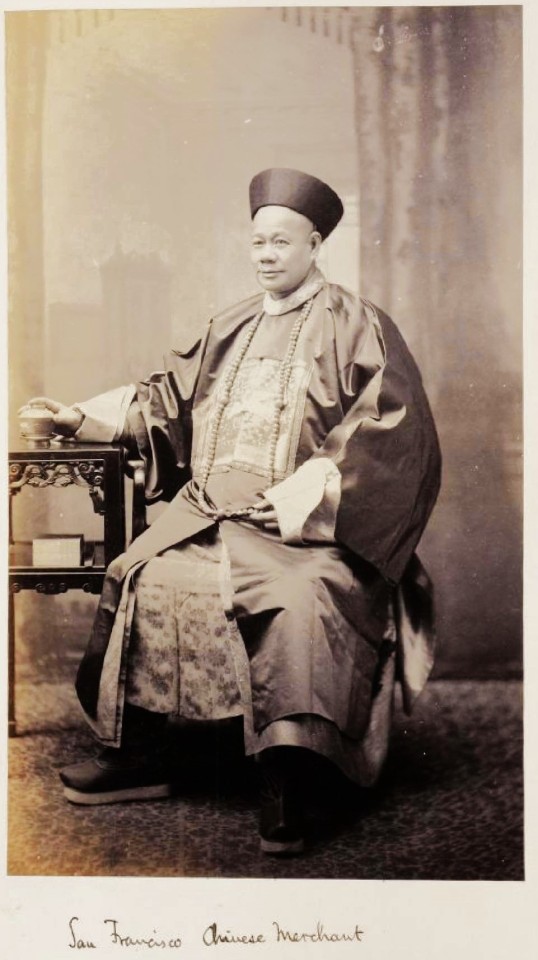
“San Francisco Chinese Merchant” no date. Photographer unknown, possibly by Ann Ting Gock (from a private collection). This rare and unusual image suggests that the individual might not have been a mere merchant at all, but a member of the Chinese consular staff. He is seen wearing his 清代官帽 (canto: "ching dai gwun moe") or official's headwear. The Qing official headwear or Qingdai guanmao (Chinese: 清代官帽; pinyin: qīngdài guānmào; lit. 'Qing dynasty official hat'), also referred to as the “Mandarin hat” in English, is a generic term which refers to the types of guanmao (Chinese: 官帽; pinyin: guānmào; lit. 'official hat'), a headgear, worn by the officials of the Qing dynasty in China. The merchant is attired in a "changshan" or "changpao" or long robe. The robe worn in the photo was derived from the Qing dynasty-period "qizhuang" (the traditional dress of the Manchu people). Changshan were, and are, traditionally worn for formal pictures, weddings, and other formal Chinese events.
Credit-ticket System
Beyond the initial years, it became widely acknowledged that Chinese immigrants arrived in the United States voluntarily, free from any servile contracts or duress. Many emigrants either financed their own passage or received assistance from relatives and friends already residing in California. The prevailing method for the majority of Chinese immigrants during the 19th century was the credit-ticket system. Under this system, an emigrant would receive financial support for their passage in a Chinese port. Upon reaching their destination, the emigrant was expected to repay this debt using their future earnings. It is important to note that this system differed from the contract labor arrangement, where laborers were bound to serve for a specified duration.
The precise origins of the credit-ticket system remain uncertain. However, merchant brokers in Hong Kong were established to provide advanced passage funds, approximately forty dollars, to the emigrants. Corresponding entities in the United States were responsible for collecting these debts and aiding the newly arrived immigrants in finding employment.
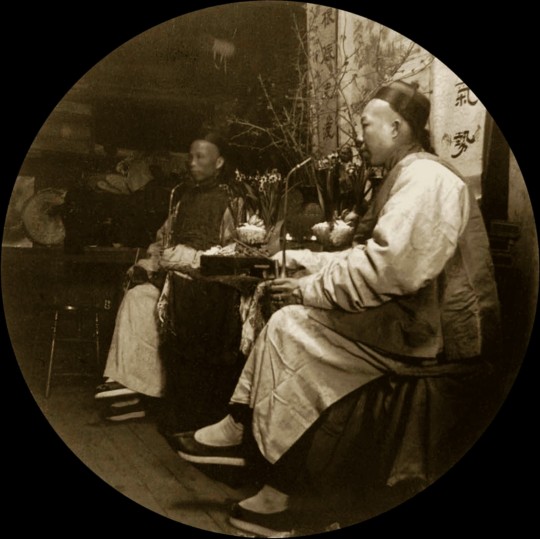
Two merchants with pipes. No date, photographer unknown (from a private collection).
The stores and offices that the merchants of Chinatown had opened starting in the mid-19th century became the basis of real and symbolic power in the growing regional community of Chinese living in the American West. That power, including the ability to mobilize for social change within the narrow role afforded Chinese in the society, manifested itself in the family and district associations headed by local merchants.
“The merchant class has traditionally been the one sector of Chinese society able to foster unity and bring about social change,” wrote historian Thomas W. Chinn about the role of the merchant class in San Francisco Chinatown (and beyond). “The merchant-directors of the Chinese Consolidated Benevolent Association must be well-established businessmen in the local community as well as outstanding members of their own family associations. They have already played a leading role in their own social circles before becoming merchant-directors, and they enjoy a great deal of respect. . . Thus the friendly corner grocer may simultaneously be the president of his family association and his district association as well as a merchant-director.”
Lew Kan
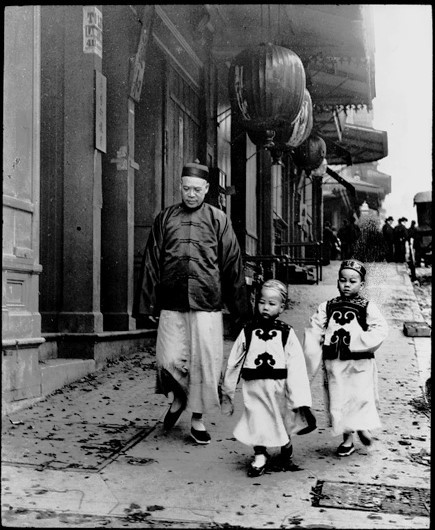
“Children of High Class” c. 1900. Photograph by Arnold Genthe (from the Genthe photograph collection, Library of Congress, Prints and Photographs Division). Merchant Lew Kan (a.k.a. Lee Kan) walking with his two sons, Lew Bing You (center) and Lew Bing Yuen (right). According to historian Jack Tchen, “Lew Kan was a labor manager of Chinese working in the Alaskan canneries. He also operated a store called Fook On Lung at 714 Sacramento Street between Kearney [sic] and Dupont. Mr. Lew was known for his great height, being over six feet tall, and his great wealth. The boys are wearing very formal clothing made of satin with a black velvet overlay. The double mushroom designs on the boys’ tunics are symbolic of the scepter of Buddha and long life.” The photograph appears to have found the trio walking down the south side of Sacramento Street below Dupont Street.
By the time photographer Arnold Genthe had photographed merchant Lew Kan and his two sons on Sacramento Street (as well as two other earlier photos of their four sisters in Portsmouth Square), Lew had already attained legendary status as one of Chinatown’s leading merchants. Born in 1851, Lew entered the US in 1866.
Author Roland Hui (in his biography of pioneer Chinese American industrialist Lew Hing), wrote about Lew Kan and his dry goods business called Lun Sing & Co. at 706 Sacramento Street as follows:
“He started Lun Sing, one of the oldest businesses in Chinatown, around 1867, a year after he immigrated to the U.S. In 1896, the business gained notoriety by harboring a young Chinese revolutionary named Sun Yat-sen during his first visit to the continental United States. Sun advocated overthrowing the Qing monarchy and establishing a Chinese republic. His ideas were too radical for the politically uninitiated Chinese community. Kang Youwei, the architect of the ill-fated “Hundred Day Reform” in China in 1898, favored establishing a constitutional monarchy around Emperor Guangxu. Forced into exile after the power-hungry Empress Dowager crushed his reform, Kang launched the Chinese Empire Reform Association, also known as Baohuanghui (Save the Emperor Society), the following year in Victoria, Canada. Baohuanghui quickly gained widespread support among overseas Chinese since the idea of having an emperor at the top of the social order who ruled with the Mandate of Heaven had been ingrained in the Chinese psyche for thousands of years. The San Francisco Baohuanghui chapter was founded in 1899 at 146 Waverly Place. Lew Kan supported Kang’s political agenda despite having met Sun several years earlier, and in 1901 became the president of the San Francisco chapter of Baohuanghui. Many scholars observed that Baohuanghui was the first organization that evoked the patriotic sentiments of overseas Chinese. And when Liang Qichao, Kang's most famous student, stopped over in San Francisco during his 1903 America tour, thousands of Chinese flocked to listen to his speeches. As the man who organized these community-wide activities, Lew Kan's stature and influence in San Francisco Chinatown must have been substantial. In addition, he was one of the wealthiest Chinese merchants, reportedly owning several general merchandise stores with an estimated net worth of $2 million. That was an astronomical sum in those days. In addition, he was a director of the Kong Chow Company, a district association representing Xinhui."
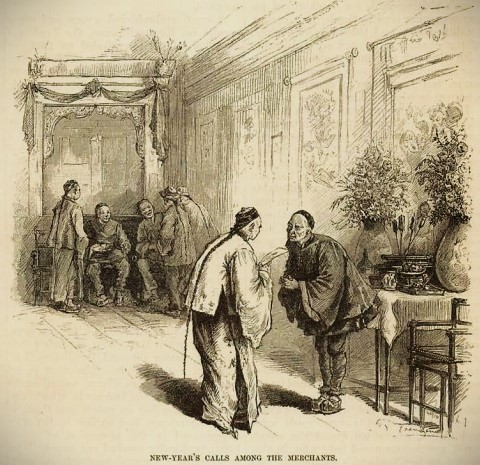
New-Year's Calls Among the Merchants" illustration from the article "The Sixth Year of Qwong See," published in Harper's Magazine, December 1880. The image may have captured merchants greeting each other at the Chinese Merchants Exchange on Sacramento Street perhaps on or about the fourth day of the Chinese New Year holiday period when business traditionally returns to normal.
Decline of Merchant Influence
The organizational expression of Chinatown’s merchant elite, the Chinese Six Companies, wielded considerable authority within San Francisco and beyond. The Six Companies and its constituent district associations comprised the quasi-government of Chinese America, offering social services, mediating disputes, and representing the community's interests to external forces. With the enactment of the Chinese Exclusion Act in May 1882, their grip on power began to weaken.
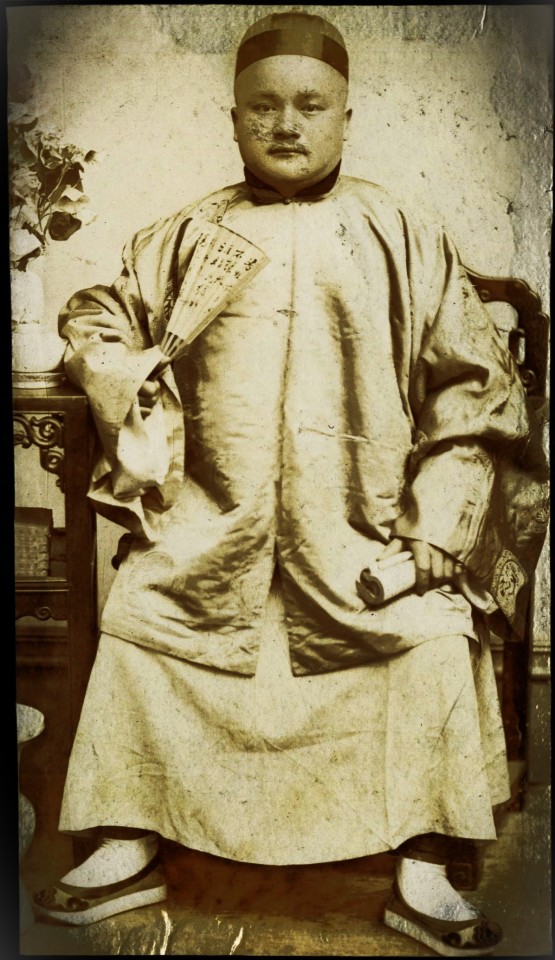
Portrait of a merchant with fan and scroll. No date, photograph possibly by Shew’s studio (based on the detail of the end-table), from the collection of the Stanford Libraries.
The decline of the Six Companies’ influence can be attributed to various reasons. One significant factor was their inability to adapt swiftly to the evolving socio-economic landscape within Chinatown. As the community faced new challenges, including the punitive extension of Chinese exclusion with the Geary Act of 1892, the Six Companies struggled to effectively navigate these changes, leading to a loss of faith among the populace in their ability to address emerging issues.
The Geary Act of 1892 extended and strengthened the Chinese Exclusion Act of 1882, requiring most Chinese Americans – native and foreign-born -- to carry an internal passport in the form of certificates of identity or face arrest and deportation. It intensified discriminatory measures against the Chinese community, fostering widespread discontent and resistance.
In response, the Six Companies initiated a national boycott against the Geary Act. The boycott aimed to unify Chinese immigrants and their supporters across the United States, urging them to refuse compliance with the law as a form of protest. It gained substantial momentum, with significant participation from Chinese communities in various cities, voicing opposition to the Act's discriminatory provisions.
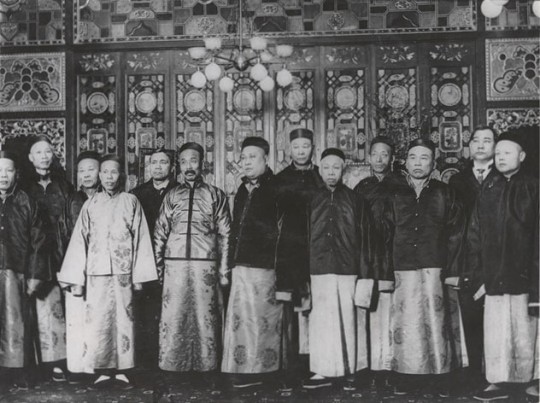
The board of directors of the Chinese Six Companies, no date. Photographer unknown (from the collection of the Bancroft Library). Based on the screen panels in the background (which remain in the Six Companies’ meeting hall at 843 Stockton Street in San Francisco), the photo appears to have been taken after 1906.
Despite its initial vigor, several factors led to the ultimate collapse of the national boycott against the Geary Act. First, the federal government intensified its efforts to enforce the Geary Act. Authorities conducted widespread raids and inspections, threatening deportation and imposing harsh penalties on those failing to comply. The fear of reprisals and the potential disruption to livelihoods coerced many Chinese immigrants into reluctantly acquiescing to the Act's demands.
Second, the broader American society exhibited little sympathy or support for the Chinese community’s plight. The prevailing anti-Chinese sentiment in the country and the lack of significant political backing from other institutions diminished the effectiveness of the boycott. Without widespread solidarity, the Chinese American community struggled to sustain its resistance.
Finally, the decision by the US Supreme Court in Fong Yue Ting v. United States, 149 U.S. 698 (1893), dealt a major legal setback to Geary Act resistance and undermined the credibility of the Six Companies. The decision validated the Geary Act and created an environment of fear within the Chinese American community. The inability to overturn the Geary Act by legal means diminished trust in the Six Companies’ capacity to protect the community's interests.

Photograph of a merchant from Chinese Business Partnership Case File for Quong Lee Company, c. 1896. Photographer unknown (from the files of the Department of Justice, Immigration and Naturalization Service, San Francisco District Office). The immigration investigative case file indicates that the individual in this photo was certified as a business partner and a "merchant" who was “able to travel to and from the U.S. as a ‘Chinese subject of exempt class’ under the ‘Chinese Exclusion Acts’ (1882-1943).” The Quong Lee & Co. (a.k.a. Quong Lee, Quong Lee Sing) operated what business directories from 1875 to 1905 variously described as a “tailor,” “general merchandise,” “clothing,” and “dry goods” business continuously at 828 Dupont Street. By the time this merchant sat for his photo in 1896, the national boycott led by Chinese merchant organizations against the Geary Act of 1892 had collapsed, and studio portraits such as this became an essential pieces of evidence to support applications for the coveted merchant exemption from the extended Exclusion Act.
This heightened sense of vulnerability played into the hands of tongs, which, capitalized on the weakened merchant community. Amidst the faltering influence of the Six Companies, tongs emerged as influential entities that would come to dominate Chinatown’s socio-political structure and shape mainstream society’s perceptions of the Chinese community for the next three decades.
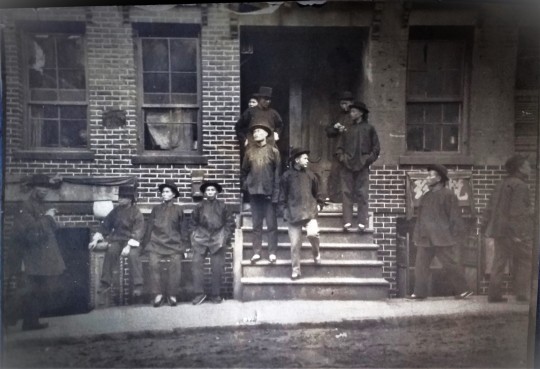
“High-binders Retreat” no date. Photograph by Goldsmith Brothers (from the Cooper Chow Collection of the Chinese Historical Society of America). Tong members at ease in front of their fraternal order's headquarters.
Tongs, in contrast to the Six Companies' diplomatic approach, adopted a more assertive stance in responding to discrimination and persecution faced by the Chinese community. Their readiness to protect their members (which also included merchants), and defy external pressures resonated with many disillusioned residents.
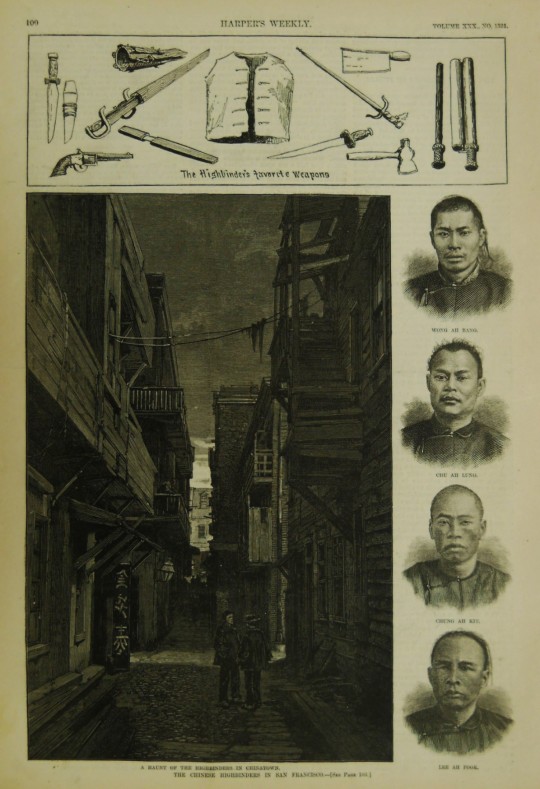
“A Haunt of the Highbinders in Chinatown.” Harpers Weekly, February 13, 1886 (from the collection of the Bancroft Library).
Moreover, the tongs during this period had begun to diversify their activities beyond traditional, illicitl sources of income such as prostitution, gambling, and drug distribution. Tongs began engaging in both legitimate businesses, including labor contracting for the Alaskan canneries. This diversification allowed them to accumulate resources, expanding their sphere of influence within Chinatown and beyond as alternative community governance structures, while still reserving often violent means to protect their interests.
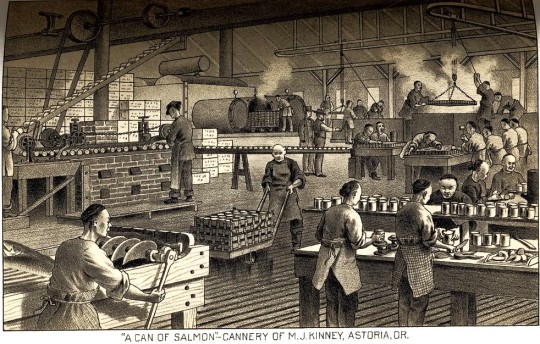
Chinese salmon cannery works in Astoria, Oregon, c. mid-1880s. Drawing from West Shore, June 1887, from the Special Collections, University of Washington). The early 20th century would be marked by violent struggles between tongs such as the Suey Sing and Bing Kung for control over the labor contracting business for the canneries.
The ascendancy of tongs at the turn of the century coincided with the republican movement in China. Historian Phil Choy wrote that the Chee Kung Tong, the original triad society, had been evolving in response to revolutionary movements in mainland China:
“Chee Kung Tong returned to its lofty political ideologies in 1900 when both Kang Yu-wei’s Reform Party and Sun Yat-sen’s Revolutionary Party sought its assistance. Originally the Chee Kung Tong supported Kang Yu-wei, but as Dr. Sun’s ideology gained popularity, the Chee Kung Tong, switched allegiance. When in 1904 immigration officials did not allow entry to Sun, the leader of the Chee Kung Tong, Wong Sam Ark, and the Tong’s attorney Oliver Stidger, along with Reverend Ng Poon Chew and Reverend Soo Hoo Nam Art, worked successfully for his release. Sun stayed at the Chee Kung Tong headquarters and used the society’s newspaper, the Chinese Free Press, to propagandize his revolutionary cause. Accompanied by Wong Sam Ark, Dr. Sun went on a nationwide tour to generate support and contributions.”
The tongs’ economic power and their active involvement in fundraising for the republican movement not only showcased their financial strength but also demonstrated their ability to wield influence as an overlapping and sometimes counter-force with the merchant elite. This dual role as (1) economic powerhouse within the local community, and (2) significant contributor to a revolutionary cause overseas underscored their influence. The growth of that influence came at the expense of the merchant elite in shaping both local and international affairs.
Merchants, however, would continue to exert influence through clan organizations, tongs, business associations, Nationalist Party of China chapters, and Chinese “consolidated benevolent associations” in San Francisco Chinatown and communities across North America through the exclusion era, war, and peace.
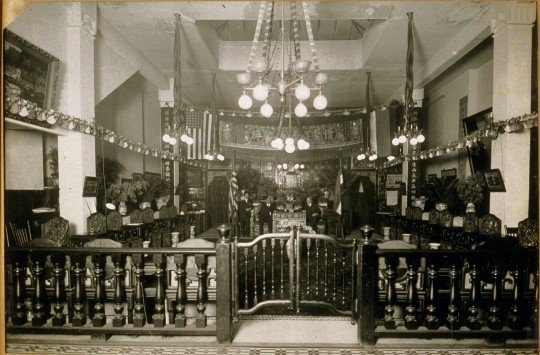
The meeting hall of the Chinese Six Companies, c. 1920 (by then incorporated as the Chinese Consolidated Benevolent Association) at 843 Stockton Street in San Francisco. Photographer unknown (from the Jese B. Cook collection of the Bancroft Library).
Chinatown's merchant community would face new challenges to their capacity as civic leaders when the political center of gravity across US Chinatowns would shift again in the last quarter of the 20th century.
[updated 2023-12-28]
#Chinatown merchants#Sing Man#Choy Chew#Chinese Merchants Exchange#Fung Tang#Lai Chun-chuen#Chy Lung & Co.#Yee Ah-Tye#Chinese Six Companies#Kai Suck#Ann Ting Gock#Lew Kan#Chee Kung Tong#Quong Lee & Co.
1 note
·
View note
Note
anything for gojo your majesty🎤🎤
if you are not a nicki minaj fan i'm sorry
gojo being a stay-at-home dad was a double-edged sword. on one hand, babytoru was getting an absurd amount of quality time with her father—on the other hand, that quality time often involved questionable educational choices. you had expected him to teach her something useful. math, maybe. how to read kanji. literally anything that would benefit her future.
instead, you walked into the living room to find your six-year-old sitting cross-legged in front of the plasma tv, gripping a pink crayon like her life depended on it, while gojo stood in front of the screen, pointing dramatically at an image of nicki minaj like he was delivering a ted talk.
"okay, kid, write this down," he said, flipping the remote in his hand like a mic. "in the beginning, there was mixtape nicki. underground legend. 'playtime is over,' 'sucka free,' 'beam me up scotty'—pure heat. this was when she really started cookin’. had wayne and drake in a chokehold. also, fun fact, this was when she still had the super thick ny accent—"
he glanced down at babytoru's notebook, then did a double take.
"baby, what the hell is this?"
she beamed up at him, proudly holding up a page where she had written, in large, wobbly pink crayon letters: nickee menaj.
gojo let out a long, dramatic sigh and pinched the bridge of his nose. "baby, this is unacceptable. you’re taking notes like a casual. like an unserious student."
"but i don’t know how to spell her name," she pouted, fidgeting with her crayon. he crouched down to her level, gripping her tiny shoulders. "listen to me. nicki minaj is a spelling bee champion. do you understand how embarrassing it would be if we couldn't spell her name right?"
babytoru gasped. "she is??"
"not officially, but spiritually," he said solemnly. "now fix it. it's n-i-c-k-i. no ‘e’s in this house."
she quickly erased and rewrote, murmuring under her breath, "n-i-c-k-i… no ‘e’s in this house…"
"good, good," gojo nodded approvingly. "okay, now where were we? ah, yes. pink friday, her debut album. iconic. certified classic. if you ask me, 'roman’s revenge' is the best track—insane flows, legendary bars. ‘did it on 'em’—a cultural reset. but of course, we can’t forget ‘super bass,’ which single-handedly raised a generation of barbz."
babytoru scribbled furiously.
"now, next, we have roman reloaded, where she gave us pop nicki—think ‘starships,’ think ‘pound the alarm.’ polarizing, but the range? undeniable." he paced the living room like a professor mid-lecture.
"then we enter the pinkprint era. arguably her magnum opus. heartbreak, bars, versatility—this is where we have ‘anaconda,’ ‘only,’ ‘feeling myself’—"
you cleared your throat loudly.
gojo froze. babytoru turned to look at you, her eyes twinkling with excitement. “mama! did you know nicki minaj is a spelling bee champion?”
you stared at your husband, who was now whistling innocently. "satoru. why is our daughter taking notes on nicki minaj like this is a university lecture?"
"because it is," he said, placing a hand over his heart. "this is the history they don’t teach in school. i’m simply filling in the gaps."
"what about, i don’t know, actual school subjects?"
"she’s learning literacy," he argued, gesturing to her notebook.
"she spelled her name wrong five minutes ago."
"papa taught me how to fix it!" babytoru chirped.
"see? she’s improving already," he grinned. "also, i’d like to point out that this is a music history class, actually. next period is music theory, where we’ll be analyzing nicki’s rhyme schemes and cadence."
you pinched the bridge of your nose. "satoru—"
"babe, come onnnnn. you of all people should understand the importance of culture."
before you could respond, he clapped his hands together. "alright, break’s over! babytoru, let’s talk about queen. underrated era, but still solid. ‘chun-li’ was a moment. oh, and don’t even get me started on ‘good form’—"
you sighed. maybe it wasn’t entirely useless. at least she was learning something.
but when you glanced at her notes again and saw "all these beaches are my suns" written in pink crayon, you decided you needed to intervene.
#@gojo#jjk headcanons#jujutsu kaisen headcanons#gojo headcanons#jjk x you#jjk x reader#jjk x y/n#jujutsu kaisen x you#jujutsu kaisen x reader#gojo satoru headcanons#satoru headcanons#gojo x you#gojo x y/n#gojo x reader#satoru x reader#satoru x you#satoru x y/n#gojo satoru x reader#gojo satoru x you#gojo satoru x y/n#jjk x fem!reader#jujutsu kaisen x female reader
419 notes
·
View notes
Text



The Scandal Of Chun Hwa 1x02
#the scandal of chun hwa#go ah ra#chang ryul#the love story of chun hwa#춘화 연애담#kdramagifs#kdrama#korean drama#kdramaedit#kdramadaily#otpsource#cinemapix#netflix#tv series#asian drama#korean#drama#kactress#actress#tv show#kdramas#tv shows#tvgifs#tvedit#dailyfilmsource
18 notes
·
View notes
Text
◇ Your first meeting ◇
(pt.1)
◇ ㅡ ㅡ ㅡ ㅡ ㅡ ◇ ㅡ ㅡ ㅡ ㅡ ㅡ ◇
💫 [ Ah, that most exciting meeting with a young man, before which you did not yet know that this boy would take that very place in your heart ]
◇ ㅡ ㅡ ㅡ ㅡ ㅡ ◇ ㅡ ㅡ ㅡ ㅡ ㅡ ◇
ㅡ Umemiya, Suo, Nirei

Umemiya
Your family's flower shop
During the holidays, your parents sent you to your grandmother in Makochi, who had a small but pretty flower shop. Spending a few weeks surrounded by flowers and calmness, away from the hectic and noisy city, seemed like a very good solution.
Today, your grandmother left for a meeting of shopkeepers from this street, so you stayed to replace her in the store.
The sound of the doorbell distracted you from the not too thoughtful scrolling social media feed on your phone.
ㅡ Wel..come
A tall white-haired young man in a funny T-shirt appeared before your eyes. He seemed big, but you instantly felt his comfort aura as soon as your eyes met.
His loud voice brought you out of a momentary trance while you were looking at him.
ㅡ Good morning! How are you feeling?
The guy beamed with a smile.
ㅡ Oh? Not bad, thanks. Are you looking for something?
ㅡ Yeah, I want to buy "Bull's Heart" tomato seeds.
You got up from behind the counter and started search shelves for the right seeds. You definitely remembered that you saw a package with such an unusual name the other day. After finding the right seeds on the farthest shelf, you returned to the counter.
ㅡ I didn't think gardening was popular among students.
ㅡ Oh? But it's a wonderful activity! I have recently ripened a sweet pepper, it cannot be described in words!
You stood and listened attentively as the young man in front of you enthusiastically talks about his gardening exploits.
Something about him got you hooked. He didn't look like the sullen boys from your town at all.
ㅡ I've been wanting to grow cherry tomatoes for a long time. I think I should also look for seeds today.
ㅡ Are you serious?
Umemia's eyes sparkled.
He told you that if you want to grow something for the first time, it's better to start not with seeds but with sprouts. And he just has a few on the roof of the school where he grows his vegetables.
He kindly invited you to come and choose one of them if you want.
And how could you refuse when those blue, almost puppy dog eyes were looking at you.
But, girl, don't think he's just giving away his precious plants to just anyone.
He was definitely interested in you at first sight conversation about tomatoes.

Suo
The tea house (Of course, it's a tea house, how could it be anything else?)
You stood and chose between Bi Lo Chun and Tie Guan Yin. It is a rather difficult choice. Both varieties reveal a floral-fruity taste and a sweet aftertaste. And of course, carried away by your reasoning over the choice, you did not notice how an elegant stranger has been watching you from another corner for 5 minutes.
Suo immediately noticed your good taste. It was not often that he managed to meet the same tea connoisseur of his age in Makochi.
When you were already starting to get nervous from the fact that you couldn't make a choice, a young man in a silk tangzhuang silently glided towards you.
ㅡ Bi Lo Chun harvest this year was particularly successful, and its fragrance is felt more deeply.
You turned at the melodious voice and saw in front of you a mysterious high school student with an eye patch and unusual earrings.
There was something fascinating about him..
The corners of Suo's lips lifted in a friendly smile, while you were slightly confused.
ㅡ Oh? Well, thank you..
ㅡ Can I ask, are you also interested in different types of tea?

Nirei
Anime Store
You were standing at the shelf and looking for a Funko POP with your favorite character from a childish but incredibly cute anime.
Having found the right one, you decided to go to the manga section. You were attracted by the bright cover of one of the manga, and you picked it up.
Then you felt someone's eyes on you. It didn't seem to you. Theree was an excited young man in a bright shirt and round glasses standing to your right. He looked like if he had a tail, he would be actively wagging it.
Damn, he really looked like a cute puppy with that expression and the sparkle in his eyes.
ㅡ Excuse me?
ㅡ Oh! I'm sorry for staring, I didn't mean to scare you, it's just... Do you like this manga too? I have not yet met the same fans of this work, but it is really interesting. And the characters here are very unusual and so well written!
You watched in surprise as Nirei quickly took his notebook out of his pocket and began enthusiastically talking about the small details of the main characters from the cover of the manga that you were holding in your hands.
Such information can usually be found only in special publications or artbooks. God, this guy seems obsessed with this case. Is he really okay?
And yet, despite this oddity, he looked so cute and enthusiastic, telling you about everything that you silently listened to, looking at his freckles.
ㅡ So, who is your favorite character?
ㅡ Oh, uh..I'm not a fan of this manga, actually..
The expression on the boy's face changed so quickly to confused and a little sad that it made your heart ache.
He blushed slightly from embarrassment.
ㅡ Oh..sor-
ㅡ But I'll read it, you've interested me with your words.
It's strange, but when this sunshine smiled again, for some reason, it felt better for you.
◇ ㅡ ㅡ ㅡ ㅡ ㅡ ㅡ ㅡ ㅡ ◇ ㅡ ㅡ ㅡ ㅡ ㅡ ㅡ ㅡ ㅡ ◇
💫 [ Okay, I've already accelerated now ]
#windbreaker x reader#umemiya hajime x reader#hayato suo x reader#nirei akihiko x reader#wind breaker x reader#windbreaker (satoru nii)#wind breaker (satoru nii)#wind breaker headcanons#windbreaker#hajime umemiya x reader#suo hayato x reader#akihiko nirei x reader#headcanon#windbreaker headcanons#wind breaker#hayato suo#hajime umemiya#nirei akihiko
295 notes
·
View notes